
???xml version="1.0" encoding="UTF-8" standalone="no"????>

(1)
Myanmar Democracy Leader
Daw Aung San Suu Kyi
Among those who had led the people in bringingdown the military dictator regime in Myanmar today tobuild a new democratic nation, Daw Aung San Suu Kyi isone of the leaders who has received the most support,trust and admiration. Apart from that, she also happensto be the democracy leader who is respected and valuedby leaders from countries all over the world. In other words,no one can deny that she is the ‘mother of the democracyrevolution’.
Daw Aung San Suu Kyi is not only someone who isgetting rid of the evil system of the present military dictatorregime, but was also the leader of the people, whostruggles with much endurance and courage, willfullysacrificing her life through hardship and isolation. Thatitself is her most esteemed honor.
That is why it is clear that Daw Aung San Suu Kyi isa person concerned with not only Myanmar, and thestruggle between herself and the military dictators is notonly an internal matter of Myanmar. The militarygovernment has no right to disregard the 1990 Election.the Myanmar people, exercising their basic rights ascitizens, during the 1990 Election, have handed the powerto rule the country on their behalf to the leader theydesired, the results of the 1990 Elections cannot bedisregarded the way the military government hoped for.The full power rests only in the hands of the people.
Besides, Myanmar being a member of the ASEAN,is also a member of the ‘ASEAN it Human Rights Commission’.
Because of that, Myanmar as an ASEAN member,also has the responsibility to protect and promote humanrights within the ASEAN region. Human rights groups inthe regions have criticized and pointed out that Myanmar,which has prohibited basic human rights issues such asfreedom to write and distribute, freedom to set uporganizations, freedom to support the political party onelikes, freedom to choose and elect the political leader onedesires, should not be accepted as a member in the ASEANHuman Rights Commission.
Regional human rights groups have been stronglypressing ASEAN for the removal of the Myanmar militarygovernment from the ASEAN Human Rights Commissionfor suppressing and violating the human rights ofdemocracy activists, including Daw Aung San Suu Kyi, inMyanmar today.
The more the military generals attack Daw Aung San SuuKyi, the more the military group is being loathed by thepeople. The more the military leaders insult the sacrificesmade by Daw Aung San Suu Kyi, the more the militarygroup is being opposed by the people. The more thepolitical role of Daw Aung San Suu Kyi is being suppressed,the more her leadership image is being brightened andheightened. Moreover, it is definite that the more themilitary group back away from her offer for politicalreconciliation, the more the military dictators will bewithout a future.
Apart from that, in the 2008 constitution which wasone-sidedly written according to the likings of the militaryregime for sustaining military rule, it can be seen thatwomen were barred from obtaining vital leadershippositions. That act, not only discriminates Daw Aung SanSuu Kyi, but all Myanmar women. Those who are barringwomen from being involved in the policy making process,are none other than the present military rulers who havecarried along the old colonial concepts.
The International agreement on Elimination of AllForms of Discrimination against Women was, with theapproval of 130 countries, verified on December 18, 1979by the General Assembly Resolution 34/180. As Myanmarhad also signed that agreement, it has the responsibilityto abide by it without reserve. According to the researchdone by the Inter-Parliamentary Union (IPU), in theinternational parliaments, there are 8,017 womanparliamentarians and 36,006 parliamentarians, andtherefore 18.2% is represented by women. It can be seenthat of the 189 countries that are practicing democracy,30 of them are lead by woman political leaders. The factthat the military group lead by Senior General Than Shweis opposing this historical trend is quite foolish.
Daw Aung San Suu Kyi is not a woman who appearedout from the blue. She is the people’s leader elected bythe people during the 88 people’s democracy movement.She is also the people’s leader who is respected andrecognized by all the ethnic peoples.
If one is to review the outcome of the election heldon May 27, 1990, it can be seen that the people over-
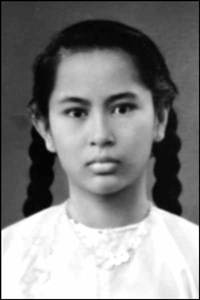
Apart from that, not only has Daw Aung San Suu Kyireceived the support of all the ethnic people, she is alsoa polital leader who has received the trust and faith oftop leaders from around the World. If the military groupattempts to ignore that point, there will never be peaceand development in Myanmar.
Because of that, efforts by the military group tosideline a wise and natural political leader like Daw AungSan Suu Kyi using different unscrupulous methods, onlyillustrates their own idiocy and ignorance.
It can be clearly seen that the primary target of the2010 election, which the military group systematicallycooked up is Daw Aung San Suu Kyi. It is an attempt toerase the 1990 Election results and Daw Aung San SuuKyi’s role using the new 2010 Elections. As the very originalintention lacked sincerity, it is quite evident that the 2008‘Nargis Constitution’ of the military regime and thePolitical Party Registration Law were projects intendedto oppose democracy and Daw Aung San Suu Kyi. For thatreason, even before holding the elections, local andforeign political analysts and democracy advocates hadassessed the 2010 Election simply as a deception like‘displaying a goat’s head but actually selling dog meat’.Just as they have assessed, the Elections that wascompleted on November 7, 2010, was being openly
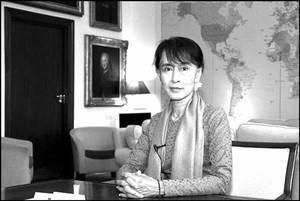
Because of that, it is quite obvious that in the entirepublic - the news of Daw Aung San Suu Kyi’s release onNovember 13th tear is in the headlines of local and internationalnews instead of the news about the results ofthe sham elections of the military regime and the comingformation of a government.
For that reason, there is no likelihood of success forthe wicked scheme of the SPDC military regime to removeDaw Aung San Suu Kyi who is imbedded in the hearts ofthe people. The reason being that there is not a trace inthe military generals, the kind of good intentions that DawAung San Suu Kyi has for her people, and no one can denythat all the people has only revulsion for the presentmilitary regime.
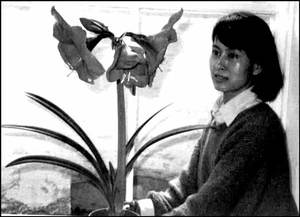
Daw Aung San Suu Kyi once stated concerning withthe good intentions she has for the people :
"What I want most for the people is for them to beable to live safely under genuine freedom and for them tofreely live with genuine security. I want to see them aspeople who can get rid of the bondage of fear. I want tosee the Myanmar people as free people with their headraised high. I want to see for all of us in a more peaceful,a more safe society built happily through a united effort."
Although Daw Aung San Suu Kyi has consistentlyrequested for settling political problems though politicalmeans, the military group has always cowardlydisregarded it. The military regime is very much afraid ofbeing prosecuted for human rights violations, misappropriationof power, stealing of the country’s resourcesand financial assets for the benefit of oneself and onesrelatives, and other wrongs they have continuouslycommitted. As fear is the result of insecurity, becausethey have done nothing for the good of the country andthe people, one can say that they are afraid to have theirmoralities brought forth before the tribunal of their ownconscience, and always live in insecurity, and are scareof retribution from the people.
As much as the people loath the militarygovernment, the reason the entire people trust andrespect, and also depend on Daw Aung San Suu Kyi isbecause of her wisdom, high spirits, and the sacrificesshe has made for her country and her people.
Because of that, in an interview related with DawAung San Suu Kyi, Dr. Hla KyawZaw, the daughter of formerbrigadier general Kyaw Zaw has said . . .
"You can see a lot of strong points in Daw Aung SanSuu Kyi. The first point is, she was able to obtain theauthority of her father, as the daughter of the Hero ofMyanmar’s Independence, Bogyoke Aung San, who all thepeople in Myanmar respects and love very much.
The second point is, Daw Aung San Suu Kyi herselfdoes not only have similar facial features with that of herfather, but also have quite a similar mind set. She is readyeven to give her life for the freedom and wealth of thepeople, and also to go through hardship. The sacrificesshe made illustrate just these.
The third point is, if you look at the politicalendeavors of Daw Aung San Suu Kyi, not only will you findthe political wisdom and big-heartedness like that of herfather, but can also unite, not only the Burmars, but alsothe different ethnics groups.
Because of that, I believe that Daw Aung San SuuKyi will be able to play a very important leadership role inthe future of Myanmar politics.
The fact that Daw Aung San Suu Kyi has widelyreceived the the international support that other politiciansdo not have and is impossible to have is in itself a strengthfor the Myanmar people who Daw Aung San Suu Kyirepresents.
To sum it up, because the people in Myanmar havefor them the leader and the firework for the struggleagainst the military dictatorship or (to say it in the wordsof Daw Aung San Suu Kyi) the leader of the Myanmar’ssecond struggle for the national independence, one cansay that the Myanmar people are very fortunate. I hopethat Daw Aung San Suu Kyi, with support from local andabroad, will be able to build a new rich nation, free frompoverty, for the Myanmar people."
Bogyoke’s Daughter Who Carried
Her Father’s Legacy
In the morning of June 19, 1945 in Yangon, theArchitect of Myanmar’s Independence and the Father ofthe Tamataw – Bogyoke Aung San and Daw Khin Kyi gavebirth to Daw Aung San Suu Kyi, who later obtained therespect and reliance of the entire public. Of the foursiblings, she is the third born, and at the time when herfather was assassinated, she was still only two years old.
She attended Saint Francis Convent in Yangon from1949 to 1957. And she continued her education at theEnglish Methodist School in Yangon (presently the DagonBEHS 1) from 1950 to 1960.
In the year 1960, Prime Minister U Nu appointedher mother Daw Khin Kyi as Myanmar Ambassador to India,
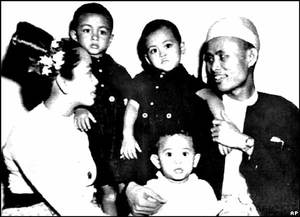
Some fragments of her stay in New Delhi togetherwith her mother can be seen in the book – "To be freefrom fear", written in Burmese language by Dora ThanAye, who is popularly known as ‘Bilatt Pyan Than’.
In the book, she wrote -
"On arriving to New Delhi with her mother, AungSan Suu Kyi was a fifteen year old girl with a long andthick pigtail. She continued her education at the Convent
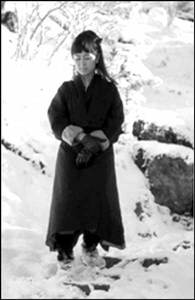
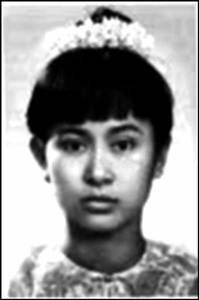
Among the arrangements that Aung San Suu Kyi’smother made to increase her experience and generalknowledge, there was the Ikebana Japanese art of flowerarrangement, studying art subjects, and learning to ridehorses. At the horse riding compound for the personal
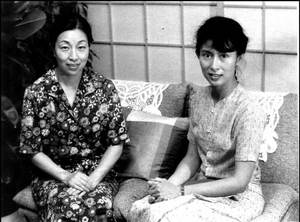
One hobby that Aung San Suu Kyi especially likedwas ‘reading’. Aung San Suu Kyi often mentioned the
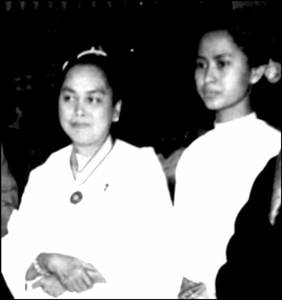
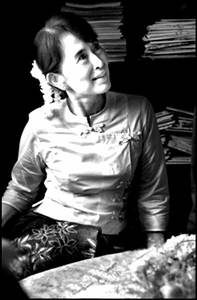
He returned to Myanmar in 1948 and was appointedas the Minister of Commerce and Cooperatives. In 1949,he was appointed as Myanmar’s first Ambassador toBritain. In 1955, he was re-assigned as Myanmar’sAmbassador to the Soviet Union, and was given full specialauthority.
Being also a lover of literature, he was one of thepersons who provided Aung San Suu Kyi with a long list ofbooks in English and in Burmese to be read. One personwho recognized the philosophical development of AungSan Suu Kyi and had keen interest in it was U Nyo Mya(1914-1958), who was an editorial member of the oncerenowned ‘Ohway’ Magazine of the Rangoon UniversityUnion and who attended the University together with AungSan Suu Kyi’s father, Bogyoke Aung San. Later on, U NyoMya became the author of many very famous books. Morethan any other, he has given Aung San Suu Kyi moreguidance to the many English and Burmese books to beread. Aung San Suu Kyi still remembers up to today howshe valued and read the very valuable set of HarvartClassic Books given to her as a present by U Nyo Mya.With those books, Aung San Suu Kyi was able to open thedoor into the world of literature.
At the Mehrauli Ward located in a suburban area ofNew Delhi, there existed a Buddhist department by thename of Ashoka Wihara which was quite deteriorated dueto lack of maintenance for quite some time. To bring lifeback to that department, Daw Khin Kyi receivedassistances from Buddhists living in New Delhi, especiallyfrom Ambassadors from Buddhist countries. As a resultof that feat, Ashoka Wihara, brought back to life forBuddhists in New Delhi and some Buddhists in other partsof India, also became the place where yearly Buddhistsfestivals were held and also became a place for worshipand meditation practices.
Daw Khin Kyi also used to invite Buddhist monksfrom Myanmar, Thailand, and Cambodia, and offeredmeals, and listened to their sermons. When Aung San SuuKyi’s brother, Aung San Oo, came from England during hisschool holidays and helped out in those matters. As muchas the Myanmars loved and respected the mother anddaughter, Daw Khin Kyi’s colleague diplomats and theIndian Government Officials, including Pandit Nehru, alsoloved and respected them. The experiences obtained inIndia proved very important for Aung San Suu Kyi and reallymotivated her. Up to now, the love and attachment shehas for India remains strong.
At that time, the British Governor was Sir Paul GoreBooth (who later received the ‘Lord’ title). During the timehe was serving as the Ambassador in Myanmar, he andhis wife, ‘Patricia’, knew Daw Khin Kyi very well. Thatfriendship was revitalized in India. When Aung San SuuKyi went to study in Oxford University, Paul and Patriciatook the responsibility of looking after her on behalf ofher parents. Aung San Suu Kyi became like a family memberand also became like a sister to their two sons and twodaughters. At their home, Aung San Suu Kyi had theopportunity to get acquainted with their friends and alsowith the politicians and government officials they invitedto their house. Aung San Suu Kyi studied with interest –the appearances, practices, the way they speak, and otheroutstanding attributes of those people. Are not thosepeople from the broad world she’ll come to deal with inthe future?
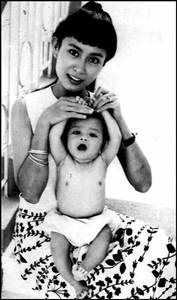
Aung San Suu Kyi used to come back to her motherin New Delhi during her summer holidays. But one year,she came and lived in Algiers, where I was. I was giventhe duty by the UN Information Department in New Delhito form a similar department in Algiers, the Capital ofAlgeria. It was not very long ago that Algeria had obtainedIndependence after signing the Treaty of Evian withCharles de Gaulle’s government in 1962. It was a countryslowly getting back on its feet after eight years of struggleto obtain independence from the French. For that reason,in was not surprising that, in Algeria that time, there werevery few places to stay, many deteriorating wards, very
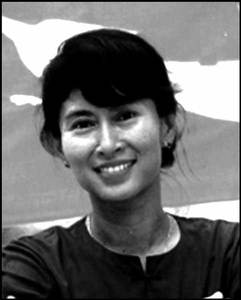
Not only embassies that were opening, UN offices,and businesses entering into the country, even the Algerianpeople themselves had to try very hard to find places tostay or do businesses. Although many of the French peoplewho had settled for a long time in Algeria had left thecountry, other young people kept coming in. Those people,who instead of doing military service chose to undertakevarious types of social work, were mostly young Frenchmen, teachers, support project workers, and those whocame just for visits.
The time Aung San Suu Kyi arrived was just a few daysafter Houari Boumedirre overthrew Ahmed Ben Bella in acoup that should be taken as a model for having beendone without any bloodshed. Instead of going to all thereceptions being invited, Aung San Suu Kyi was more keenon meeting with Algerian people and study the things thatwere happening in their country. Aung San Suu Kyi broughtalong with her a case full of books to read and study. Wecontacted an organization that supported those who wentthrough years of struggles for independence. One youngman in charge of a project came and explained to us abouttheir activities. As they were building houses for wiveswhose husbands were killed in their struggle forindependence, he told us how they welcome help fromnot only Algerians, but also young people from othercountries. Aung San Suu Kyi herself went and stayed inthat construction camp for many weeks and did voluntaryworks. The supervisor was a Russian and the colleagueswere young people from Algeria, France, Lebanon,Netherlands, and Germany. Although they provided foodand shelter, they did not give wages.
Aung San Suu Kyi’s friends once took her to theKabyle Mountain Ranges to go and see a weddingceremony. The two of us together went on a long journeyto a town located at the outskirts of the Sahara Desert.As the summer heat was terrible, we couldn’t continueany further than where we got. And we were also able tovisit the ruins of a city built during the Roman times. Onthe stone pavements of the open theater located in theruins, the forces loyal to Ben Bella wrote in big words –"Long Live Ben Bella". Aung San Suu Kyi proceededtraveling to Morocco, and also did a quick visit to thesouthern shores of Spain. After that, she continuedstudying her school lessons and went back to Oxford atthe end of the school holidays."
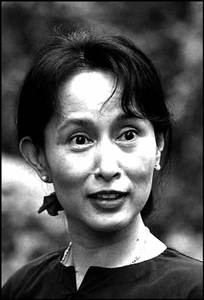
In the years 1962-1963, Aung San Suu Kyi studiedpolitical science at New Delhi University. Between 1964and 1967, she studied philosophy, political science, andbusiness at St Hugh’s College in Oxford University, andreceived a BA Honours degree. After obtaining her degree,Daw Aung San Suu Kyi gave lectures at St Hugh’s Collegefor about a month. After that, she did research workstogether with the historical researcher Hugh Tinker. In1968, she served as Assistant Researcher at Eastern andAfrican Study Department, Political Science Department,at London University.
After that, she arrived to New York to to stay togetherwith Bilatt Pyan Than, who was then living in New York, inthe United States. Dora Than Aye, also known as BilattPyan Than, after serving in Algeria for 4 years, was
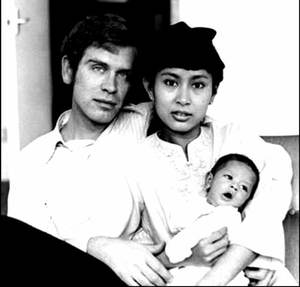
Only after joining the United Nations, Daw AungSan Suu Kyi had the idea of continuing her education. Aftersurpassing the normal routine and difficulties of writingapplications, obtaining recommendations, and goingthrough interviews, Daw Aung San Suu Kyi finally got ajob at the United Nations. After working at the UnitedNations for 2 years, she got the opportunity of serving asassistant secretary at the Finance and AdministrationAdvisory Committee at the General Secretary’s Office.
The committee members of that department werenot appointed as representatives of their countries, butwere selected for their skills in financial matters. Thatcommittee had to study, assess, prepare, and submitapproval for project plans and budgets of not only theUnited Nations and its organizations, but also specialagencies such as World Health Organization and Food andAgricultural Organization. Although it was a tough job, itwas interesting for having to assess in detail the costs ofUN’s expenses and because of having to work togetherwith its highly intelligent members. Daw Aung San SuuKyi came to get acquainted with them very well.
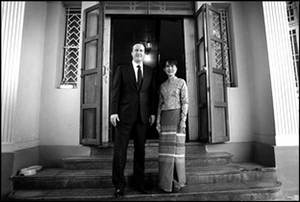
The UN staff used to work as volunteers in theafternoons and in their free time on the weekends.
At a place not very far from the house in Manhattanwhere Daw Aung San Suu Kyi was living, the poorest ofthe city with incurable diseases and helpless and homelesspeople were cared for at the Belleview Center, which wasopened by the New York Hospital. The sick that cannotbear life anymore were used to be brought to that hospital.Volunteer men and women were always needed to takepart in the programs for reading and taking care of theMyanmar people there. Daw Aung San Suu Kyi took partin that program and worked as a volunteer for many hoursevery week.
This is an example of the social welfare mindednessthat Daw Aung San Suu Kyi inherited from her mother, DawKhin Kyi.
During that time, U Thant from Myanmar wasserving as the General Secretary of the United Nations.
His residence which has a view of the Hudson River waslocated at Riverdale District and is one and a half hoursdrive from Daw Aung San Suu Kyi’s place. The Sunday mealsat U Thant’s Residence were occasions that Daw Suuenjoyed a lot. Other friends of U Thant also came and allsort of Myanmar cuisine that the Myanmar people lovedwere usually served. In special occasions like on thebirthday of U Thant’s grandson, not only the Myanmarspeople but permanent UN representatives from othercountries were also invited.
The manner in which U Soe Tin, the permanent UNdiplomatic representative from Myanmar, did hisinvitations and hosting of the events were a little different.He also lived in Riverdale, in a house not as grand as theresidence of U Thant. During the time of the holding ofthe General Assembly from the second week of Septemberto around the mid of December, U Soe Tin, in addition tohis works, was fully occupied entertaining Myanmar andother representative groups. In the months of Thadingyutand Tazaungmon, during special religious days, he usedto invite and entertain the Myanmar friends living in NewYork. Being a magnanimous person, U Soe Tin didn’tdiscriminate between sheeps and goats among theMyanmars. Goats mean those who criticized and pointedout the situation of Myanmar under the military dictator– U Nay Win, and they were normally sidelined by theMyanmar Embassy circle. At U Soe Tin’s home, anyonecan freely express and debate their different point ofviews.
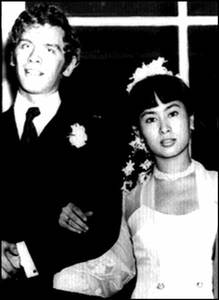
One day, at the time of the convening of the UNGeneral Assembly, U Soe Tin invited Daw Aung San SuuKyi and Bilatt Pyan Than to his home for a meal, and BilattPyan Than related what happened during that occasion."We arrived at U Soe Tin’s house in Riverdale aroundafternoon. In the square shaped living room filled withflowers, garden crotons, and golden Myanmar lacquerware, the sofas and chairs were pushed back to the wallsand the big tables with coffee cups were placed in frontof the chairs. On the sofas and chairs, the Myanmardiplomats who came to attend the General Assembly weresitting on them. After those we didn’t know wereintroduced to us, and ‘Suu’ was asked to sit at the cornerof the room, between two prominent persons. For me, I was asked to sit not very far from Colonel Maung lwin,who headed the delegation. After U Soe Tin’s wife hadplaced the fruit juice and potato chips on the table, shewent into the room nearby to make final food cookingarrangements. After everyone was done with their socialchats, the head of the delegation asked ‘Suu’ how she isworking with the United Nations? Which passport wasshe holding? As her mother was no longer the ambassador,‘Suu’ will have to return her diplomatic passport, is it rightthat it is still not returned yet? That holding on to thediplomatic passport is not legal, that she must haveknown, and that is most irregular and should be rectifiedas soon as possible, and continually attacked her.
Those from the Myanmar diplomatic world, partlyto make face and gain favor, approved what U Lwin wassaying and looked at ‘Suu’ with unwanted expressions.That ‘Suu’ was able to remain calm and unmoved, mademe a bit relieved. After that, ‘Suu’ politely, with dignity,and right to the point replied that she had applied longago at the Myanmar Embassy in London but still had noword from them, that she couldn’t understand why it wastaking that exceptionally long, in coming to New York forher studies, she had to hold on to the present passport,and when looking for a job for her living, she luckily got aposition at the United Nations, the passport was requiredto show that she is a Myanmar citizen, that she was stillwaiting for the passport she had applied for months agoat the Embassy in London, that she will willingly returnthe old passport as soon as the new one arrives, that she
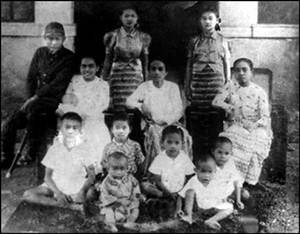
The Myanmar Ambassador who came from Londoncertified that ‘Suu’ had applied for a new passport manymonths ago, and that the application was sent to Yangonaccording to the normal procedures. And he added thathe had no idea why it was being delayed for many months.In truth, everyone in the room was quite aware that suchdelays that always occur in Myanmar were results of theconfusing bureaucratic mechanism and the many stepsof red tapes, causing such impediments. At that time,other ambassadors also came to understand that ‘Suu’can‘t do anything more than what she had already done.The facial appearance of the head of delegation became like, to take the words of Myat Lay – "a face that canneither cry nor laugh", and said in a low apologetic tonethat at first he didn’t know the complete situation, thatwhen he get back to Yangon, that he himself will instructthe passport department to have everything done quickly.Although those persons were much older in age than ‘Suu’,I concluded that they were not ‘grownups’ with goodqualifications that should have come with their age. I thentook the opportunity and said "We’ll just have to hope forthe day when passports will no longer be needed". Afterthat we ate lunch together.
Among the permanent representative delegates,there was a friend who openly discussed about thesituation in Myanmar with us. When that friend say thatthe criticisms of ‘Suu’ were too bold, ‘Suu’ replied – "Notonly am I brave because of what I believe in but alsobecause it has been a tradition for me". What she meantwas – ‘Suu’ being the daughter of Bogyoke Aung San andDaw Khin Kyi, she can’t be easily intimidated. What I thinkis – not only is ‘Suu’ the daughter of Bogyoke Aung San byblood, she also has the will of ‘Aung San’, and she isdefinitely a father-like-daughter."
While Daw Aung San Suu Kyi was still working atthe United Nations Office, she married Dr. MichaelViallancourt Aris, who she had fallen in love during herUniversity days, on January 1, 1971. Michael Aris was aBritish citizen and was a researcher at Oxford University,studying the social and cultural history of NorthernMahayana Buddhism. He also had written and publishedmany books on the subject.
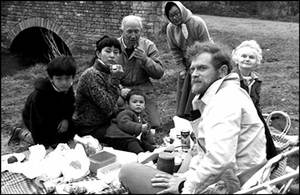
After serving three years at the United NationsOffice, Daw Aung San Suu Kyi decided to no longercontinue working and chose the life of a housewife livingtogether with the children. From there, she started a newchapter in her life. The things that happened after thatare known to most people. Her husband, Michael Aris,had for many years taught the King’s princes andprincesses at the Himalayan Country of Bhutan and alsoworked as a senior official at the government’s translationdepartment. Daw Aung San Suu Kyi lived in Bhutan forabout one year. As Bhutan became a member of the UnitedNations not very long ago, Daw Aung San Suu Kyiimmediately got the job of advisor for United Nationrelated to matters at the Bhutan Foreign Ministry.
Daw Aung San Suu Kyi and her husband returned toEngland to give birth to their first born child – Myint SanAung alias Alexander John Christopher Aris. Their eldest son, Myint San Aung, was born on Thursday, April 12, 1973.Not long after Michael started teaching at doctorateclasses in London University, he worked at OxfordUniversity as a scholar. The second child, Htein Lin aliasDannaian Kim Arunde Aris, was born on Saturday,September 24, 1977. Daw Aung San Suu Kyi then lived apeaceful life raising her children and visiting her motherin Yangon.
While maintaining the responsibilities of ahousewife, Daw Aung San Suu Kyi started writing. Beingvery keen on reading, she had collected many bookswritten in English and French languages. The Tibetanbooks and research related books of Michael had alsoincreased day by day, and there was even no more spaceto keep them at home. The children also grew up asenthusiastic readers.
From 1975 to 1977, she served about two years asassistant librarian, taking care of Burmese books andcataloging palm leaf manuscripts at the Bodleian Libraryin Oxford University.
After that, Daw Aung San Suu Kyi started thinkingabout writing a biography of her father – Bogyoke AungSan. Hence, she started learning Japanese language withgreat ardor. As japan is connected with part of BogyokeAung San’s life, from how he contacted with the Japaneseand how he took the 30 comrades to Japan and how theyunderwent military training in Japan, and, in the end, howthe struggle for Myanmar independence was done withthe Japanese, to study the data connected with Japan.
Apart from that, she started collecting books on Myanmarwritten in English and Burmese languages and books onJapan written in English and Japanese languages. As shehad intended to write the biography of Bogyoke Aung Sanwith strong verification, she started conductingsystematic research.
On the other side, between 1985 and 86, sheaccepted a scholarship award, and did research work asa researcher at the Southeast Asia Study Department atTokyo University in Japan. While doing research in Japan,she met with members of the Japan-Myanmar FriendshipTeam, and from them, she got in contact with Japanesemilitary officers who knew her father and who were stillliving. During that time, Michael was at the Indian AdvanceLiterature Study Department at Shimla in Northern Indiaas a researcher fellow.
While conduction the research, in 1987, he workedas a research fellow at the Indian Institute of AdvanceStudy at Shimla, in India.
At that time, Daw Aung San Suu Kyi planned to writea dissertation for a doctorate degree at the School ofOriental and African Studies at London University inLondon. One can say that her activities during that periodillustrated her strong will and resolve.
The title of her dissertation was – "The Contributionof Journalism during Myanmar’s Struggle for Independence(1910-1945)".
On that same year, her mother, Daw Khin Kyi, arrivedin London for cataract surgery. As the operation was successful, although she had some discomfort because ofthe medical treatment, it was a time when she was happy.
After staying in London about 2 months, Daw KhinKyi happily came back to Myanmar in June, 1987 whenthe condition of her eyes improved a lot. She also wroteto many of her friends about how happy she was duringher visit to London and was quite pleased to be able tomeet with them.
But less than 10 months after getting back to Yangon,on March 31, 1988, she suffered a severe stroke. Daw AungSan Suu Kyi, holding of the work she was doing at Shimla,came back to look after her mother. Her brother Aung SanOo, who was working in the US, also came back for about10 days.
Aung San Suu Kyi regularly visited her mother beforeand after getting married. Daw Khin Kyi, at about one yearbefore her eye operation, together with the familymembers, organized the Buddhist novice monk ceremonyfor her grandchildren at her home in Yangon. Daw AungSan Suu Kyi, Michael, and their two sons came back toLondon from India in September, 1987. While settling backin the academic world at the University, the news of DawKhin Kyi’s stroke arrived. Daw Aung San Suu Kyi, right aftergetting the telegraph, returned back to Yangon with thefirst flight available, to look after her mother.
In 1988, Daw Aung San Suu Kyi, who arrived backbecause of her mother’s illness, unexpectedly came intocontacted with the turn of events in Myanmar. Here, it is
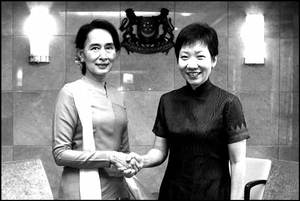
Thankin Ohn Myint is someone who was personallyintimate with Bogyoke Aung San. He was also a memberof Dobama-Asiayone2, and was also the editor of Toe TetYay (Progress) and Journal Kyaw Journals. Thakin Ohn Myintwas born on April 28, 1918 in Lepadan, Bago Region. HisFather was U Pho Kaung and his mother was Daw Aye Tin.In November 1933, he started anti-colonialism activitieswhen he distributed Dobama-Asiayone proclamationleaflets at the State High School in Lepadan. In March1934, he finished high school at the State High School inLepadan, and without attending medical college, heworked in the newspaper world in Yangon, and lived inYaykyaw Area with Journal Kyaw U Chit Maung.
In April 1938, he attended the 3rd All Burma StudentsUnion Conference held in Pathein. In June 1938, he started working as editor for Toe Tet Yay newspaper. In 1938, the"Tatse of the Prison" book which he edited becamepopular. He also wrote articles in Kyaw Journal. In January1939, because of an article he wrote with the pen name –Si Mi Kwet3, the Toteyay Newspaper was put on bail. Inthe same year, he was chose as a member of the workingcommittee at Dobama-Asiayone Head Quarters.
After Bogyoke Aung San was killed in 1947, he hadless contact with Daw Khin Kyi and family, and was ableto go and have contact only about once a year. After Dawkhin Kyi arrived back to Myanmar, retiring from the positionof Ambassador to India in 1967, he was able to meet upmore frequently. At that time, Daw Aung San Suu Kyi wasdoing her having her education in England.
In 1984, when Daw Aung San Suu Kyi made a shortvisit to Myanmar, she once again met with U Ohn Myint.At the time Daw Aung San Suu Kyi was working on herdissertation, she had asked U Ohn Myint to help hercompile the needed historical data. U Ohn Myint compiledthe needed historical data by photo copying from librariesand buying books from second hand shops.
After that, the health situation of Daw Khin Kyideteriorated and U Ohn Myint frequent Daw Khin Kyi’shome every day and helped out with whatever that wasneeded. In 1986, when Daw Aung San Suu Kyi came backto Myanmar for a short trip after obtaining her doctorate,her mother - Daw Khin Kyi did the novice monk ceremonyfor her two sons. After the ceremony, at the time wheneveryone in the family was around, U Ohn Myint discussedabout his wanting Daw Aung San Suu Kyi to take someresponsibilities for the country and the people.
After that, in May 1987, Daw Khin Kyi went toEngland for eye operation, and returned to Myanmar inthe first week of June. After Daw Khin Kyi received thestroke at the end of March, Daw Aung San Suu Kyi cameback to Yangon on the first week of April. U Ohn Myintopenly told Daw Aung San Suu Kyi concerning with DawKhin Kyi’s health that as she is at the age where he doesnot think that there is any way she’ll be able to recover. Atthat time, Daw Khin Kyi was 75 years of age.
He added that in case her mother dies, he wantedDaw Aung San Suu Kyi to stay in Myanmar and take aresponsibility for the country without going back toEngland. Daw Khin Kyi passed away on December 27, 1988.She had already worked out that if she was to stay inMyanmar permanently and act for the country and peoplewith sincerity, resolve, and conviction, that she will haveto make personal sacrifices and also about the difficultieswaiting for her ahead. At that time, the democracymovements that followed the March student protests wereunderway.
(2)
Chapter (2)
Background History
The Military’s Revolutionary Council, headed byGeneral Ne Win, which did a coup d'état and overthrewthe Union Party Government, established the BurmaSocialist Program Party, known as B.S.P.P., on July 4, 1962.
The B.S.P.P. had for 26 years disillusioned the peoplewith socialist ideologies, and forcefully implemented theBurmese Way to Socialism, pushing the alreadyeconomically developing Myanmar, which was one ofSoutheast Asia’s richest natural resources countries, intoeconomic and political upheavals, and putting it into thelist of the World’s Least Developed Countries.
While such situations were happening, the 1988uprising came about from an ordinary street fight whichresulted from an unexpected clash between some studentsfrom the technology institute and some youths from theWest Ward of Kyogyone, Insien Township.
At around 9:15 pm, Saturday evening of March 12,1988, inside Sandar Win Tea Shop which was located near
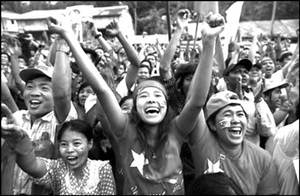
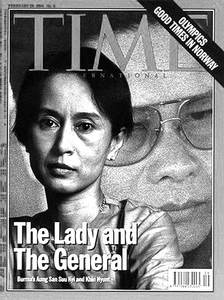
On March 13, 1988, the Insein Police Departmentreleased Zaw Zaw alias Nyi Nyi Lwin as he was the son ofthe ward council chairman. When the students heard thatZaw Zaw was released, about 20 technology institutestudents went and protested at the ward council office.The council chairman became furious, and stones werethrown at the council office. Clashes then brokeout againbetween technology institute students and the wardcouncil’s son and youths from West Kyogyone, and somemore student were injured. When the students heard thenews of what happened, they grouped together and threwstones and chairs at Sandar Win Teashop and the WestKyogyone council office and yelled and cursed at them.While those were taking place, the ward cooperative shopcaught fire, so the people in that ward extinguished thefire and attacked the students. The tension between thetwo groups increased, with the Insein road dividing thetwo sides.
The local authorities did not peacefully solve thesensitive situation, but instead, sent the riot police tocontrol the situation by force, and at around 3 in themorning of March 14, the groups temporarily dispersed.As shot were fired in the process, 5 students were injured,and among them, two day-class technological institutestudents – Maung Phone Maw, age 23, and Maung SoeNaing died. Maung Phone Maw had been the secretary ofthe technological institute’s football team since the yearbefore and was on his way to handover the accounts tothe new secretary. He stumble upon the commotion andwas hit by the gunfire of the security forces. The teachersand students carried the wounded Maung Phone Maw andhid him inside the compound of the technological institute.Maung Soe Naing died not long after arriving to thehospital.
Because of that, on March 14, the students fromthe technological institute, continued to protest about thestudents who were killed. And they also made demandsconcerning with student rights to the government.
(a) For schools to remain open,
(b) For removing security police placed around theuniversity compound,
(c) To send a responsible person who can settle thedemands as soon as possible to negotiate with5 student representatives, and not to come nearif the cannot solve the problem.
Apart from that, at around 2 in the afternoon thatday, they posted the following demands on the Universitycompound walls and at the betel juice shops:
(a) To put in the newspapers about what actuallyhappened on March 13, 1988.
(b) To allow the students to bury the dead students.
(c) The make a memorial record for the innocentstudents who died.
(d) To take action against those who used teargasand shot live bullets.
(e) For an official organization to take the responsibilityof handling the demands of the students.
Although the Dr. Maung Di, the Deputy Minister ofEducation, immediately went and negotiated with thestudents on the next day, which was on March 15, it didn’tgo well and the tension remained. At that very moment,about 500 riot police invaded the Rangoon Institute ofTechnology campus and beat the students, with manystudents arrested, and some wounded. Because of that,the situation inside the technological institute compoundwent out of control. During that time, the authoritiesannounced that the students who want to return to theirnative places can go do so, and temporarily closed theschools. The protests at the Rangoon Institute of
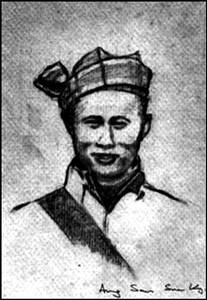
''It was stated in it that commands were giventhrough the walkie-talkies to "Break the heads, hit hard!",and girls had their hair pulled, kicked into the lake, andgirls who ran away with their sarongs removed were beaten up, and two bodies of the girls were found in thelake. It was also written in it that, on the night thathappened on the bank of the Inya Lake, many were killed,and the bodies were cremated that night, and the parentswere informed about the deaths through letters only afterabout a month, and the riot police entered the prisonsand beat the students, the girls were raped, and manywere tortured inside the prison, and that 283 persons died.
Similarly, on March 17, the student gathering insideRangoon University was dispersed forcibly. But in theB.S.P.P. newspapers, it states that only 154 demonstratingstudents were arrested. It also stated that no one waskilled or injured.
As the B.S.P.P. government can no longer ignore thedemands of the students, a commission of enquiry wasformed on March 17. The commission was to investigateand report on the upheaval with the students of theRangoon Institute of Technology on March 12, 1988. Thecommission was announced as Socialist Republic of theUnion of Burma Council of State Notification 45/88 datedMarch 17, 1988, and according to it, that commissioncomprised of -
(a)U Ba Maw (Council of People's Justices Member)– Chairman
(b)U Hla Tint (Council of People's AttorneysMember) – Member
(c)Dr. Maung Shein (Council of People’s InspectorsMember) – Member
Apart from that, in that Notification, whoever thechairman chose will act as secretary and the commission
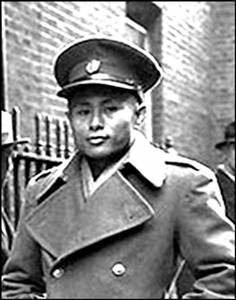
While the government was doing the investigations,the students and the people combined and continued withthe demonstrations. During the March riots, as much asmany students and people’s blood were shed because ofthe violent actions, and many more were injured andarrested.
On March 18, those who were peacefullydemonstrating on Theinbyu Street were arrested and ataround midnight were sent to Insein prison with prisonWhen arriving to Insein Prison, it was found that out of 71persons on a truck, 41 of them were dead. According tothe government’s media, it happened because there wasa lack of prison trucks, and they had to place moreprisoners then they were supposed to, and although itwas only a 45 minutes drive, it took the trucks around 2hours because of the road blocks.
The Botataung Township Police Chief, on March 19,1988, asked the Botataung Township Justices Council toopen a manslaughter case for those you died and have itinvestigated. The Botataung Justices Council, on that sameday, went with the township official doctor and theconcerned police officers to Insein Prison and did theinvestigation. According to the manslaughterinvestigation, it was found that the deaths were causedeither because of having inhaled gas from the tear gas,or because of suffocating due to putting more personsthan they should inside the prison trucks. Concerning withthat matter, it was announced on July 19, 1988, and itsaid the reason behind the delay in making it public wasin order to avoid escalating the unrest.
Because of those deaths, U Min Gaung, the Ministerfor Home and Religious Affairs, resigned. Apart from that,Prime Minister U Maung Maung Kha and Chairman of theCouncil of People's Attorneys U Myint Maung, who werepartly responsible for the riots that happened in March
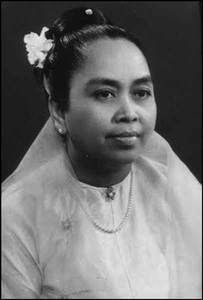
(1) The letter - "Well, how is it now?" dated May12, 1988,
(2) The letter - "The Inya bank case" dated June 8,1988,
(3) The letter - "The Sanchaung, MyaynigonYadanarbon Cinema cases" dated July 22, 1988,
(4) The letter - "For the two of us only" dated July9, 1988,
(5) The letter - "Case to obtain full human rights"dated July 19, 1988
were distributed accordingly.
No matter what they may be, the letters of U AungGyi that were distributed that time among the peopleawaken the political spirit of the people. If one is to studyeach of the letters, it can be seen as follows:
(a) In the letter written on May 12, 1988, thesituation of the country 26 years after theRevolutionary Council took power, not only wasit deteriorated, it was totally destroyed and thepolitical, economical, and social aspects havefallen, the subordinate responsible people tookthe responsibilities, I had also written a reportabout it, and it was also rumored that beforebrigadier Aung Gyi quit, he said that he will holdthe position of Party Chairman for 3 years, andthat if he was not successful, that he’ll let BoAung Gyi handle it, Among the politicalcolleagues, only U Nu, the Party Chairman, andBrigadier Aung Gyi are left and the rest havedied, and that there will soon be ‘rice’ relatedproblems soon, and almost all of the businessin industrial sector have been shut down, hadto give warning about the coming problemswere stated.
(b) In the letter written on June 8, 1988, the studentunrest was given priority. In the introduction ofthe letter it was clearly stated that he was notresponsible for the demolition of the studentunion building that happened sometime before.Concerning with the March 1988 student unrest,the Party Chairman should not take the blameas the Party Chairman was not responsible forit, that the students were not responsible forthe burning down of the cooperative shop atKyogyone Ward, it was torched to destroy thedocumentations to coverup those who hadcommitted misappropriations, the studentswere cornered and beaten on the banks of InyaLake, the girls had their hair pulled and beaten,kicked into the water, and even the girls whoran away without their sarongs had their hairpulled and beaten up, and two bodies of girlswere found in the water. It was a response anda blow to the government media’s misinformationwhich stated that there were nodeaths or serious injuries. Apart from that, inthe letter of Brigadier Aung Gyi wrote that manydied on the night it happened on the banks ofInya Lake, the bodies were cremated within thatnight, the parents of those who died wereinformed only after a month’s time, the riotpolice entered the prisons and beat up thestudents, and raped the girls, and many weretortured inside the prison, and 283 people died.Those who read this letter were shocked andoutraged.
(c) On the letter written on March 7, 1988, it waswritten that former brigadier Aung Gyi met withthe politicians in Japan and discussed aboutthings that will benefit the country, as thereare was problems in foreign relations dealingwith Ministers presently in position, so theyhave approached him so that he can relay it tothe chairman.
While the letter of U Aung Gyi was being spreadoutside, the report on the unrest that happened betweensome students from the Rangoon Institute of Technologyand some people from West Kyogone Ward that happenedon March 17, 1988 was submitted on May 13, 1988. Inthat report, findings from the detailed investigations werestated in 14 chapters, with a total of 292 pages.
If one looks into the ‘Phone Maw Unrest’, the B.S.P.P.military rulers’ first big mistake was siding and protectingthe chairman of the ward council and disproportionateuse of riot police and violently suppressing the students.The second mistake was not only was there a strict mediacensorship, there were also falsified news broadcastings.Although the riot police were under the supervision ofthe Home Ministry and the Police Commissioner, accordingto the B.S.P.P.’s organization mechanism, the chain ofcommand was not clear, and there were manyinterventions from above. In the Rangoon Division too,there are three authorities who can give command - theRegional Party Chairman, the Division Council Chairman,and the Rangoon Command Commander. In bringing inthe 22nd, 44th, and 77th light infantry divisions for thesecurity of Yangon, they were brought in without theimmediate awareness of the Commander-in-Chief, and insuppressing the riots, the commanders were not happyabout the riot police being involved.
On May 30, 1988, when the schools re-opened, thestudents who were released from the prisons related theirexperiences, and demonstrations happened continuouslyfrom June 15 to June 20, at the Recreation Center inRangoon University. Many people, including monks,workers, and even high school students, joined in.
On June 21, although it was announced that theschools are being closed again, the strikes spreadthroughout the country. On that day students from theMain Rangoon University and Medical College 1 cameout of the campuses and joining with the people, wentand demonstrated at Hlaing, Sanchaung, Kamayut,Mayangon, and Insein townships. At Sanchaung Township,the policed fired on the peaceful demonstrators, and therewere deaths and wounded. On that same day, thestudents continued marching along Pyay Road towardsthe Medical College at the center of Yangon, and afterpassing Hantharwaddy Circle, on arriving Myaynigon, theriot police tried to stop the demonstrators, and as clasheserupted between the students and the riot police, thepeople watching nearby joined and attacked, resulting inthe death of 20 riot police and over 100 of thedemonstrators.
Although it was falsely stated in the governmentnewspapers that, because of the attack by rioters using all sorts of weapons, six members of the people’s policeforce died and 25 were seriously injured, it covered upthe death of the people.
During that period, there were public demonstrationsin Taunggyi and Pyay, and Section 144 wasissued. But the riots and demonstrations in Pyay could nolonger be controlled, so, on July 22, 1988, the governmentannounced ‘martial law’ and the army suppressed it usingarms.
While the riots were going-on in major cities of thecountry, on July 23, 1988, the emergency congress of theB.S.P.P. was convened. In that meeting, Although U NeWin, the Chairman of the Party, resigned because he wasguilty, he left a black spot in history by challenging themass and the students, by saying, "The army never shootsinto the air, if they shoot, they shoot to hit". On July 24,the second day of the B.S.P.P. Emergency Congress, YebawMaung Thint from Tamadaw Organizing Committee talkedabout U Aung Gyi’s 41 page letter. According to what hesaid, "The clarification about the truth of the demolitionof the student union building on July 8, 1962 is a politicalploy about a fact that happened in history, and it is foundthat it is just as attempt by former Brigadier General UAung Gyi to make the students and the mass have amisunderstanding on the Chairman, that is just somethinghe created to divide the three forces of the nation, whichare the people, the Tamadaw, and the country’s leaders,by taking advantage of that union’s matter to instigatethe people uprise, and furthermore, made false
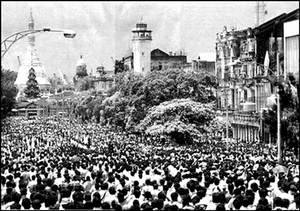
But decisions were made on July 25, the third dayof the emergency congress, to accept the resignations ofthe Program Party Chairman U Ne Win and the Party’sGeneral Secretary U San Yu, as they didn’t want to hold areferendum to decide whether to accept the resignationor not, thus the decision was made.
On July 26, the Tenth Central Committee Meetingwas held at the Pyithu Hluttaw Convention Room, andthe Central Committee members elected U Sein Lwin asParty Chairman. Apart from that, the Prime Minister UMaung Maung Kha and Chairman of the Council of People'sAttorneys U Myint Maung were dismissed for the case ofsuffocating to death of 41 persons on the prison truck.After that, also at the Fourth Pyithu Hluttaw Conventionthat was held on July 27th, U Sein Lwin was apointed asthe Chairman of the National Council and as President ofthe country. Apart from that, U Tun Tin was appointed asthe Secretary of the National Council. On July 28th, thestudents, in defiance against the ban on gathering, openedstrike camps at Shwedagon Pagoda, and carried on withthe demonstrations.
On July 29, the military regime detained U Aung Gyiand nine of his associates (U Kyi Han, AP Journalist USein Win, U Khin Nyo, U Kyi Maung, U Ba Shwe, U Chit KoKo, U Tun Shwe, U Aung Myint, U Zaw Win Oo), as apreventive measure ‘according to criminal law procedures’- ‘in order to prevent an attack against the state’.
The situation worsened, and the anti governmentslogans showed up on the streets. Starting from July 29,1988, it spread to the schools located in the townshipswithin the municipal areas of the capital, Yangon. Thedemonstrating students, from that day till August 2nd,opened strike camps on the platform of ShwedagonPagoda. The demonstrating students handed out leafletsto the public audience who came and grouped on theplatform of the pagoda and gave anti government rallyingspeeches.
After the students ganged up with the people, theycame down from the pagoda and demonstrated in sometownships in Yangon.
The BSPP government therefore, on August 3rd, underthe Council of State Proclamation No. 5/88, proclaimedthe Emergency and Military Administration in RangoonDivision. Apart from that, the executive powers andjudicial powers were delegated to the Chief of Staff of the Defense, General Saw Maung. On that very sameday, the Chief of Staff of the Defense, in accordance withthe power delegated to him under the Council of StateProclamation No. 5/88, promulgated the MilitaryAdministrative Announcement No. 2 of the Office of theChief of Staff, delegated Yangon Command Commander,Brigadier General Myo Nyunt, the powers to AdministerYangon on his behalf.
Thus, starting from 7pm of August 3rd, 1988 to August24th, 1988, the Military Administrative Orders werepromulgated by the Yangon Command as follows:
(a) Yangon Command, Military Administrative OrderNo. (1/88)
(b) Yangon Command, Military Administrative OrderNo. (2/88) under which the administrative andthe judicial directive was promulgated.
(c) Yangon Command, Military Administrative OrderNo. (3/88) concerning with law within theadministrative region.
(d) Yangon Command, Military Administrative OrderNo. (4/88) concerning continual administrationof the various stages of the People InspectionBoards.
(e) Yangon Command, Military Administrative OrderNo. (6/88) concerning curfew and ban fromgathering of five persons and more.
(f) Yangon Command, Military Administrative OrderNo. (9/88) abolishing the orders in MilitaryAdministrative Order No. (6/88).
On August 5, 1988, the Military Advisory Committeewas formed with 7 persons including a high military officerfrom the Tamadaw and a member of the Council ofPeople's Attorneys. Apart from that, Chief of Staff of theDefense, General Saw Maung formed the MilitaryAdministration Committee by allowing the YangonCommand Commander to utilize all power delegated tohim through Military Administrative Announcement No.2 of the Office of the Chief of Staff as follows:
(a) Brigadier General Myo Nyunt – Chairman(Division Commander, Yangon DivisionCommand)
(b) U Ye Win – Member (Chairman, Yangon DivisionRegional Party Committee)
(c) U Kyaw Thein – Member (Chairman, YangonDivision People’s Council)
(d) Colonel Aung Khin – Member (Mayor, YangonCity Development Committee)
(e) Colonel Thant Zin – Member (DeputyCommander, Yangon Division Command)
(f) Colonel Khin Myint – Member (Commander ofMilitary Region No. 1)
(g) Colonel Thein Tun – Member (Commander ofMilitary Region No.2)
(h) Colonel Thar Htay – Member (Commander ofMilitary Region No.3)
(i) Colonel Myo Swe – Member (Commander ofMilitary Region No. 4)
(j) Lieutenant Colonel Thein Myint – Member(Chairman, Divisional Magistrate)
(k) U Myo Nyunt – Member (Chairman, DivisionInspection Committee)
(l) U San Myint – Member (Police BrigadierGeneral, People’s Police Head Quarters)
(m) Colonel Zaw Min – Member (Director General,Myanmar Fire Services Department)
(n) Dr. U Sein Yi – Member (Yangon Division HealthDepartment)
(o) Lieutenant Colonel Aung Than – Secretary(Military General Staff Officer (1)
(p) Lieutenant Colonel Tin Ohn – Joint Secretary (Assistant Military Attorney, Yangon Command)It is said that the BSPP government took such actionof proclaming martial law for the security of the Stateand to protect and safeguard the life, limb and propertyof the working people, in accordance with internationalpractices, according to the Council of State ProclamationNo. 5/88 which was done using powers delegated in section76 of the Constitution of the Socialist Republic of the Unionof Burma.
After the proclamation of Martial Law, the All BurmaStudent Union, defying the Martial Law proclamation,starting distributing rallying leaflets for the 8888 GeneralStrike and many people joined in with the demonstrations.
From the time Martial Law was declared from August3 - 8, 1998, and because of the armed crackdown bysecurity forces of the large number of protesters innineteen cities, including Yangon, thousands of peopledied, including Buddhist monks, students, and ordinarycivilians. On August 8, 1988, hundreds of thousands ofpeople took part in the general strike that will go downinto history. At five in the afternoon that day, while thedemonstrators gathered in front of the city hall, makingdemands and shouting anti government slogans withdemonstration leaders taking turns giving speeches to thecrowd, the Commander of Yangon Command arrived andordered the people to disperse immediately, using aloudspeaker. The crown fearlessly carried on with theiroriginal program, and at around eleven that night, twolight infantry brigades repeatedly fired upon the crowdfrom inside the city hall, and the blood of thousands ofpeople was shed once again. On August 11, the army onceagain fired at various organizations, unions, and groupswho were peacefully demonstrating, and thousands ofpeople were again killed and wounded.
On the August 8, 1988 issue of the TIME magazine,a foreign magazine, President Sein Lwin, the person whomercilessly gave the command to shoot, was called a‘butcher’.
On that same day, the furious crowd overran someof the township police stations in Yangon Division, burningand destroying them. In the same manner, on August 19,1988, the demonstration continued in major cities all overMyanmar.
Because of those situations, on August 12, U SeinLwin had to resign from the position of Chairman of BSPPand of Chairman of the Council of State.
U Sein Lwin, who had a notorious reputation insideand outside the country, was born on January 22, 1942, at Kawt Kayin Village, in Paung Township, Mon State. Hisfather was U Shwe Yin and his mother was Daw Mar Gyi.Low in Education, joined the army as a private at the 3rdCompany under the First Battalion, and during theJapanese era, attended the Mingaladon MilitaryAcademy’s Officer’s Training 3rd Batch. After that he servedunder the 3rd Infantry Regiment, Chin Rifle Regiment, andthe No. 4 Rifle Regiment.
He later served as Deputy Commander of South-WestCommand and as Commander of North-West Command.From there, he served as Minister for the Ministry ofCooperatives, Ministry of Transport And Telecommunications,and Ministry of Religious and Home Affairs.
He then served as a Member of the Council of State,as the Secretary of the Council of State, and as the JointGeneral Secretary of BSPP. After resigning from thepositions of Chairman of BSPP and of Chairman of theCouncil of State, he died on April 9, 2004.
The BSPP government released the followingcovered up figures concerning with the numbers of thosekilled, wounded, and detained during the 8888 DemocracyMovement that happened between August 8 and August14, 1988.
(a) Deaths - Male (106), Female (8), with atotal of 114 persons.
(b) Injured - Buddhist monk (6), Male (304),Female (26), with a total of 336persons.
(c) Detained - Buddhist monk (27), Male(2,557), Female (381), with atotal of 2,965 persons.
And for figure the security forces killed and woundedduring that period, the numbers were released as follows
(a) Tamadaw
(1) Deaths - 2 persons
(2) Injured - 10 persons
(3) Weapons lost - 1
(b) Police
(1) Deaths - 16 persons
(2) Injured - 4 persons
(3) Weapons lost - 27
For the cost of damages incurred during that periodbecause of the violence, was also released with figuresunder relevant ministries –
(a) Ministry of Construction Kyats 1,827,260
(b) Ministry of Information Kyats 802,255
(c) Ministry of Energy Kyats 2,843,983
(d) Ministry of Agriculture and Forestry Kyats 141,550
(e) Ministry of Industry (1) Kyats 725,346
(f) Ministry of Cooperatives Kyats 10,373,778
The 88 Democracy Movement that occurred inAugust, 1988, didn’t happen just in Yangon, but also tookplace in township throughout the country, and there weremany lost of lives and property.
During that period of confusion, the BSPP Party’sCentral Committee’s 11th Convention was held on August19, 1988 at the Pyithu Hluttaw Covention Room, in Yangon.At that meeting, the vacant position of the Party chairman was filled. The 4th Pyithu Hluttaw Session was held in theafternoon and subsequently it was announced that Dr.Maung Maung has been chosen as the Chairman of theCouncil of the State and as the Country’s President.
After becoming President, Dr. Maung Maung, withthe Council of State Proclamation No. 7/88, formed onAugust 19, 1988, the ‘People's Desire AssessmentCommission’ with U Tin Aung Hein, Chairman of theCouncil of People's Justices, as Chairman with elevenmembers, to tackle matters concerning with the political,economical, and administrative situations presentlyhappening in the country as follows –
(a) U Tin Aung Hein - Chairman (Chairman of theCouncil of People'sJustices)
(b) U San Maung - Member (Member of theCouncil of State)
(c) U Sai Aung Tun - Member (Member of theCouncil of State)
(d) Dr. Mann Thet San - Member (Member of theCouncil of State)
(e) U Ba Nyein - (Vice Chairman, WorkerOrganization, Central HeadOffice)
(f) U Chit Swe - (Vice Chairman, FarmersOrganization, Central HeadOffice)
(g) Dr. Tun Thin - (Rector, Mandalay MedicalCollege)
(h) U Hla Tun - (Pyithu HluttawRepresentative, Kyauk Tan2)
(i) U Saw Hlaing - (Principal, Hinthada College)
(j) U Aung Toe - Secretary (Member,Employee Selection andTraining Board)
(k) U Khin Maung Aye- Secretary (Director General,Central Court, the Council ofPeople's Justices)
During that time, Thakin Ohn Myint introduced DawAung San Suu Kyi with Thakin Tin Mya.
Thakin Tin Mya asked for two agreements for himto accept Thakin Ohn Myint’s request to help out DawAung San Suu Kyi.
(1) In the essay – ‘a request to the government andthe people’ written by Daw Aung San Suu Kyi and U HtweMyint, contains group politics concerning with the BSPPmembers, and that is wrong. To withdraw that view.
(2) If in the future Multi Party Democracy cameabout and if political parties arises, to accept his (ThakinTin Mya) not being involved in the political parties.
As Daw Aung San Suu Kyi replied to those twoagreements, Thakin Tin Mya contacted Daw Aung San SuuKyi to help her out. After that, as Thakin Tin Mya hadadvised, Daw Aung San Suu Kyi wrote and publishedanother essay about removing the phrase about singlingout BSPP Party in the essay written by Daw Aung San SuuKyi - the "Coordinating and Solving Problems ThroughHolding the People’s Advisory Conference" essay.
At that time, Daw Aung San Suu Kyi contacted ThuraU Kyaw Htin, Secretary of the Council of State anddelivered a letter of request. She also made attempts tomeet with him in person, but didn’t get the permission todo so. After that, Daw Aung San Suu Kyi tried to pass onher thoughts to Dr. Maung Maung through Thakin TinMya’s help. It was learnt that, concerning with Daw AungSan Suu Kyi’s request, Thakin Tin Mya advised Aung SanSuu Kyi that if U Tin Aung Hein, Chairman of the Councilof People's Justices, agrees, to meet with him first, andlater meet with Dr. Maung Maung. As Daw Aung San SuuKyi agreed to it, Thakin Tin Mya went and discussed withMajor Ye Htut (member of the Thirty Comrades) aboutDaw Aung San Suu Kyi meeting with U Tin Aung Hein.Major Ye Htut met with U Tin Aung Hein and discussedabout U Tin Aung Hein acting in between to enable DawAung San Suu Kyi to meet with President Dr. Maung Maung,and subsequently, U Tin Aung Hein agreed to it.
After making arrangements for Daw Aung San SuuKyi and U Tin Aung Hein to meet, on August 21, 1988, themeeting took place. Daw Aung San Suu Kyi explained UTin Aung Hein about the ideas contained in the"Coordinating and Solving Problems Through Holding thePeople’s Advisory Conference" thesis and asked forassistance to act in between for the opportunity to meetand discuss with Dr. Maung Maung.
During that time, Daw Aung San Suu Kyi expressedto Thakin Tin Mya her desire to meet and discuss withformer political leaders and intellectual groups, and ThakinTin Mya made the arrangements for her. Thakin Tin Myamet with Maung Ko Yu, who was acquainted with him,and asked for assistance in helping Daw Aung San Suu Kyimeet the intellectuals.
According to the plan, at around 1 pm of August 21,1988, on the top floor of a teashop near Bo Thura Streetin Kyi Myin Daing, Daw Aung San Suu Kyi and formerpoliticians – Wi Du Ra Thakin Chit Maung, Thakin KhinAung, Thakin Tun Khin; from the Layers’ Association – UBa Tun, Maung Ko Yu, U Tun Tin, Monywa Tin Shwe;literary persons – U Win Tin (Hantharwaddy Newspaper),Maung Thaw Ka, U Hla Win (a pilot); members of DawAung San Suu Kyi’s office – Thakin Tin Mya, Bo SantharKyaw, U Thar Tun (Kyaukphyu), U Hla Tin, attended themeeting.
The meeting recognized the ‘People's DesireAssessment Commission’ lead by U Tin Aung Hein, anddecided to peacefully conduct people's desire activitieswithin the legal framework, and also for Daw Aung SanSuu Kyi to hold a public conference as soon as possible.
During that time, on August 24, 1988, a lettercontaining 10 points came out on 23.8.88 from the PatrioticFormer Commanders to Dr.Maung Maung, Chairman ofthe Council of State, appeared. In those ten points, it ismainly concerns about matters like - ‘one party or multipleparties?’, ‘whether a referendum on the desire of thepeople is necessary or not’, and ‘to form an interimgovernment and hold democratic elections’. The formermilitary commanders who signed in the document were –
(1) Former Brigadier General U Aung Shwe
(2) Former Colonel U Saw Myint
(3) Former Colonel U Lwin
(4) Former Colonel Thiha-thura U Hla Maung
(5) Former Colonel U Kyi Win
(6) Former Colonel U Shwe
(7) Former Colonel U Tin Oo
(8) Former Colonel U Tin Maw
(9) Former Colonel U Thein Toat
(10) Former Colonel U Chit Khaing
(11) Former Colonel U Tin Tun
(12) Former Colonel U Ba Aung
(13) Former Colonel U Aye Maung
(14) Former Colonel U Kyi Maung
(15) Former Colonel U Tun Aung Kyaw
The Democracy Strike Committee (Yangon) alsoexpressed its views as follows:
(a) In the present situation, the desire of the peoplehas already been expressed and therefore areferendum is not necessary.
(b) To protest against emergency convention forholding a referendum and an emergencyHluttaw Session.
(c) To eradicate the present Constitution.
(d) To announce in all regions, townships, wards,and villages that the Hluttaw and all governingbodies have been removed by the people.
(e) To immediately set up an interim government.
(f) To hold a multi party election as soon as possible.
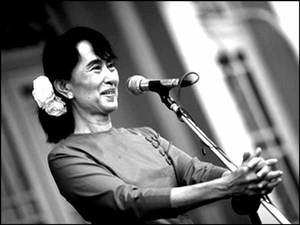
Due to such demands from the entire public, it wasannounced that the ‘People's Desire AssessmentCommission’ has been dissolved. On that very same day,President Dr. Maung Maung announced the ending of themartial law.
Also on that same day, all those detained, includingU Aung Gyi, and a total of 2750 prisoners were releasedfrom the prisons.
The BSPP Party Chairman and President Dr. MaungMaung televised a speech, concerning with the presentsituation, to the nation on August 24, at eight in theevening. In that speech Dr. Maung Maung said . . .
". . . in two or three week time, an emergencyconvention will be convened. A referendum to know thedesire of the people about whether one party system or a multi-party system is preferred will be proposed. If theconvention rejects the referendum to know the desire ofthe people, all the fourteen members of the party’s centralworking committee, including myself, will resign from ourpositions at the party. And if the convention decides tohold a referendum, it will be decided at the Pyithu Hluttawon the next day and will make arrangements to hold thenation-wide referendum as fast as possible. A commissionwill be formed to supervise the referendum with personsthat the people respect through coordination with thepeople. In those elections, I myself, and members fromCouncil of State, Ministers, Council of People's Justices,Council of People's Attorneys, and Council of People’sInspectors will not take part. After electing the people,will work on handing over to the organizations that’ll beformed according to the duties invested in theconstitution."
As the revoking of the Martial Law was announcedas such, the security forces inside Yangon werewithdrawn, and they repositioned themselves at theoutskirts of Yangon, at important buildings, factories, andUniversity campuses.
After the security forces were withdrawn fromYangon, many criminal prisoners from prisons, includingthe one at Insein, were released. The criminal prisonersreleased from those various prisons started breaking intowarehouses, mugged and killed people, and destroyedpublic property. For that reason, people at differenttownships and wards had to form guard groups and erectedbamboo fencings, carrying sword, spears and pointedbamboo shafts and organized day and night security shifts.During that time, former Brig. General Aung Gyi, who wasreleased from detention on August 24, gave a speech onthe evening of the next day at the Padoma field inSanchaung Township, in the presence of 5,000 people. Inthat event, U Aung Gyi talked about not to destroy theTamadaw, not to offend the Tamadaw even within one’smind, for the present leaders to resign, forming of aninterim government, and about democracy.
On August 26, Daw Aung San Suu Kyi also gave apublic speech by the western gateway of ShwedagonPagoda. Bo Yan Naing, member of the 30 comrades, andactor U Tun Wai were also present at the event. Daw AungSan Suu Kyi said – "Venerable monks and people! Thispublic rally is aimed at informing the whole world of thewill of the people. Therefore at this mass rally the peopleshould be disciplined and united to demonstrate the veryfact that they are a people who can be disciplined andunited. I would also like to apologize for the delay of thismeeting for about an hour. It was because the roads wereblocked on our way coming over here.
Our purpose is to show that the entire peopleentertain the keenest desire for a multi-party democraticsystem of government. It is the students who have pavedthe way to the present situation where it is possible tohold such a rally. The occasion has been made possiblebecause the recent demonstrations have beenspearheaded by the students and even more because they have shown their willingness to sacrifice their lives. Itherefore request you all to observe a minute's silence inorder to show our deepest respect for those students whohave lost their lives and, even more, in order to share themerit of their deeds among all of us. So while doing thisplease keep perfect silence for the duration of one minute.The voice of the master of the ceremony – (I thereforerequest everyone to observe a minute's silence as a saluteto those students who have lost their lives).
I believe that all the people who have assembledhere have without exception come with the unshakeabledesire to strive for and win a multi-party democraticsystem. In order to arrive at this objective, all the peopleshould march unitedly in a discip-lined manner towardsthe goal of democracy. In this connection I would like toexplain the part I have played in this movement. This isneeded because a fair number of people are not very wellacquainted with my personal history. It is only natural andright that those who do not know me would like to knowsome facts. A number of people are saying that since Ihave spent most of my time abroad and am married to aforeigner I could not be familiar with the ramifications ofthis country's politics. I wish to speak from this platformvery frankly and openly to the people. It is true that I havelived abroad. It is also true that I am married to a foreigner.These facts have never interfered and will never interferewith or lessen my love and devotion for my country byany measure or degree.
Another thing which some people have been sayingis that I know nothing of Burmese politics. The trouble is
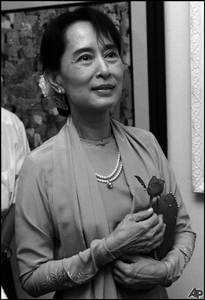
Since my father had no such desire I too have alwayswanted to place myself at a distance from this kind ofpolitics. Because of that I have kept away from politics.Some might then ask why, if I wished to stay out of politics, should I now be involved in this movement. The answer isthat the present crisis is the concern of the entire nation.I could not as my father's daughter, remain indifferent toall that was going on. This national crisis could in fact becalled the second struggle for national independence. Thisgreat struggle has arisen from the intense and deep desireof the people for a fully democratic parliamentary systemof government.
I would like to read to you something my father saidabout democracy. "We must make democracy the popularcreed. We must try to build up a free Burma in accordancewith such a creed. If we should fail to do this, our peopleare bound to suffer. If democracy should fail the worldcannot stand back and just look on, and therefore Burmawould one day, like Japan and Germany, be despised.Democracy is the only ideology which is consistent withfreedom. It is also an ideology that promotes andstrengthens peace. It is therefore the only ideology weshould aim for". That is what my father said.
It is the reason why I am participating in thisstruggle for freedom and democracy in the footsteps andtraditions of my father. To achieve democracy the peopleshould be united. That is very clear. It is a very plain fact.If there is no unity of purpose we shall be unable to achieveanything at all.
If the people are disunited, no ideology or form ofgovernment can bring much benefit to the country. Thismust be firmly fixed in the minds of the people. If there isno discipline, no system can succeed. Therefore ourpeople should always be united and disciplined.
While I am talking about the need for unity I wouldlike to say one thing. Some may not like what I am goingto say. But I believe that my duty is to tell the peoplewhat I believe to be true. Therefore I shall speak my mind.If my words meet with your approval, please support me.If they are not acceptable, it cannot be helped. I am onlydoing what I believe to be right. What I wish to say is thatat this time there is a certain amount of dissensionbetween the people and the army. This rift can lead tofuture dangers. The present armed forces of Burma werecreated and nurtured by my father.
It is not simply a matter of words to say that myfather built up the armed forces. It is a fact. There arepapers written in my father's own hand where he lays outin detail how the army should be organized and built up.So what objectives did my father have for the armedforces? Let me read to you one of them:
"The armed forces are meant for this nation andthis people, and it should be such a force having the honorand respect of the people. If instead the armed forcesshould come to be hated by the people, then the aimswith which this army has been built up would have beenin vain."
Let me speak frankly. I feel strong attachment forthe armed forces. Not only were they built up by my father,as a child I was cared for by his soldiers. At the sametime I am also aware of the great love and affection whichthe people have for my father. I am grateful for this loveand affection. I would therefore not wish to see any splits and struggles between the army which my father built upand the people who love my father so much. May I alsofrom this platform ask the personnel of the armed forcesto reciprocate this kind of understanding and sympathy?May I appeal to the armed forces to become a force inwhich the people can place their trust and reliance. Maythe armed forces become one which will uphold the honorand dignity of our country. For their part the people shouldtry to forget what has already taken place, and I wouldlike to appeal to them not to lose their affection for thearmy. We shall reach our goal of a strong and lasting Uniononly if we are all able to go forward in unity. We have notyet achieved this goal. Let us not be disunited. Thereforelet us resolve to march forward in unity towards ourcherished goal. In doing so please use peaceful means. Ifa people or a nation can reach their objectives bydisciplined and peaceful means, it would be a mosthonorable and admirable achieve-ment.
I have a few things to say about the students whohave been at the forefront of this nationwide movement.The students are most able. They have alreadydemonstrated their physical courage. I believe that theywill now go on to demonstrate their moral and mentalability.
May I appeal to the students to continue to marchforward with the same kind of unity and resolve? At thismoment there are a number of student groups. I wouldlike these groups to come together as a unified body. Iunderstand that they are soon going to call a conferencefor this purpose. Should this occasion arise may I praythat it will result in an entire cohesion and unity of thestudents.
Some students have asked me which politicians arestanding behind me. They are apprehensive that suchpoliticians might manipulate me and then take over thestudents. I am happy that the students have been so openand honest with me. Young people are frank and free fromdeviousness. I answered them truthfully. There are nopoliticians behind me. What I am trying to do is to helpachieve the democratic system of government which thepeople want. For the achievement of this system, thereare some veteran politicians who wish to help me invarious ways. I have told such politicians that if theirobject is to obtain positions of political power forthemselves, I would not support them in any way.
Should these politicians try to obtain positions ofpolitical power I promise in front of this assembly ofpeople that I myself will not hesitate to denounce them.
There is a sort of gulf between the older and youngergenera-tions. This gulf will have to be bridged. There isthe feeling that the older and younger generations arequite apart from each other. This is something that shouldnot happen. Whether young or old the entire people shouldbe united. The strength of the people is growing day byday. Such growing strength has to be controlled bydiscipline. Undisciplined strength or strength which is notin keeping with right principles can never lead to abeneficial fruition.
It could lead to danger for many. Therefore pleasecontinue to use our strength in accordance with rightfulprinciples. At this juncture when the people's strength isalmost at is peak we should take extreme care not tooppress the weaker side. That is the kind of evil practicewhich would cause the people to lose their dignity andhonor. The people should demonstrate clearly anddistinctly their capacity to forgive. If we are to examinewhat it is that we all desire, that is what the people reallywant at this time, the answer is multi-party democracy.We want to get rid of the one-party system.
The President, Dr Maung Maung, has said that heis calling an emergency party congress to decide whetherthere should be a national referendum. So far as I amconcerned I do not think it is necessary to have thisreferendum. The entire nation's desires and aspirationsare very clear. There can be no doubt that everybody wantsa multi-party democratic system of government. It is theduty of the present government to bring about such asystem as soon as possible.
For the people's part they should continue todemonstrate for this through peaceful and disciplinedmeans. May I emphasize again that we have not yetarrived at our cherished goal. Please think in advance ofwhat should be done to bring about a firmly establishedUnion. Please think of the country's future. Unless weconsider the future of our country, the changes that arecoming into being may not be able to achieve much benefitfor the country. My father said there is a great need forthe people to be disciplined and this cannot be repeatedtoo often.
We do not need to have a referendum. What we doneed is a multi-party system. It should be introduced asquickly as possible by means of free and fair elections.Conditions necessary for the holding of free and fairelections should be created throughout the country. Thepeople have lost their confidence in the govern-ment ofthe day. If the holding of free and fair elections requiresan interim government, such a forerunner should becreated.
The main objective is not to have either the presentform of government, nor an interim government, nor tohave some other new government, but to have agovernment that can bring about a strong and prosperousUnion of Burma. Please do not lose sight of the mainobjectives, nor forget the future welfare of the country.Should we lose sight of these, present victories will changeto future failures. What stage have we reached now? Well,our cherished aim is clearly within sight. Let us marchforward together towards that goal. Let no divisions creepin. It is important that divisions of opinion should not ariseamong the students. There should be a complete restrainton creating such divisions. Therefore should differencesarise between them now the country's future unity willbe jeopardized.
While I am on the subject of unity may I speak for awhile on the union of states of which Burma is composed.The different peoples of Burma should also remain united.
The majority people of course remain the Burmese. Theymust strive with ever-increas-ing efforts to live in thisaccord and amity. Because the Burmese people form thebiggest majority, they should make the greatest efforts tolive in this accord and amity and to achieve that muchneeded unity and friendship among national racial groups.Those who have the greater strength should showrestraint and tolerance towards those who have lessstrength. Here I wish to say one thing regarding thosepeople who are supporting the one-party system. The factis many members of the Lanzin Party have themselveslost faith and confidence in their party. Such partymembers should resign from the Lanzin Party. They shouldhand in their party cards.
However, those who continue as members of theLanzin Party out of conviction should not be molested.Democracy is an ideology that allows everyone to standup according to his beliefs. They should not be threatenedor endangered. Each one should go forward towards hisown goal. Do not because of your greater strength bevengeful towards those who are of weaker strength. Wehave gone far beyond the intended time, so I must cutthis short. The final remark I wish to make is for our rallyto maintain unity and discipline. Our strength should beused for the cause of what is right. Only by observingthese requirements shall we be able to find our goal.
May the entire people be united and disciplined. May ourpeople always do what is in complete accord with rightfulprin-ciples. May the people be free from all harm. Toconclude I would like to reiterate our emphatic demandsand protests, namely that –
- we have no desire at all for a referendum,
- that the one-party system should be dismantled,
- that a multi-party system of government shouldbe established,
- and we call for free and fair elections to bearranged as quickly as possible.
These are our demands.
" The people also overwhelmly supported Daw AungSan Suu Kyi’s demands and the meeting ended at 11:30 inthe morning with the chanting of the people.
During that time, former Prime Minister U Nu formedthe ‘Democracy and Peace Party (Provisional)’ on August29, 1988 at Bahan Township, Yangon Division, with U Nuas the Patron and 21 members listed below –
(1) U Nu (former Prime Minister) - Patron
(2) Mann Win Maung (former President of the country) - Chairman
(3) Major Aung (former Chairman of the Hluttaw) - Vice Chairman
(4) Thura U Tin Oo (former General)- General Secretary
(5) U Than Sein (former Parliamentary Secretary) - Joint General Secretary
(6) U Aung (Myingyan) - Trustee
(7) Thakin Chit Maung (Wi Du Ya) - Executive
(8) Thakin Khin Aung (Tharrawaddy)- Executive
(9) Thakin Thein Pe (Wakaema) - Executive
(10) U Aung Shwe (retired Brig. General) - Executive
(11) U Saw Myint (retired Brig. General) - Executive
(12) U Khin Maung (former Minister) - Executive
(13) U Tun Sein (Myeik) - Executive
(14) Major Tun Tin (Chairman of Electric Power SupplyBoard) - Executive
(15) U Ba Swe (former Second Secretary) - Executive
(16) U Nyunt Aung (former Parliamentary Secretary)- Executive
(17) Thakin Chit (Vice Chairman / Bar Council)- Executive
(18) U Ba Tun (Chairman / Rangoon AttorneysCouncil) - Executive
(19) U Ye Gaung Nyunt (former Parliamentary Member)- Executive
(20) U Thu Wai (former member of the DemocracyParty) - Executive
(21) Dr. Van Ko Haw (retired Ambassador) - ExecutiveThe objectives of that Democracy and Peace Party(Provisional) are . . .
(1) To put all effort to solve the present ongoingproblems.
(2) To work for materialization of the legal demands ofthose protesting for democracy. That organizationheaded by U Nu was not only the first one thatappeared for the protests but was also the first stepto forming an interim government.
In the same way, unions such as the All BurmaStudents Union, All University/College TeachersAssociation, Rangoon Young Monks Union, Health StaffUnion, Medical College and Students Union, NorthOkklapa Students Union, were organized and set up. Apartfrom that, Yankin No. 1 Basic Education School, SouthOkklapa No. 2 Basic Education School, Dagon TownshipPeople's Council Office, Dagon Township Party Unit Office,Latha Township Party Unit Office, Lanmadaw TownshipParty Unit Office and the Township People's Council Officewere used as camps by the students and unionorganizations.
On August 31, 1988, the Council of MinistersAnnouncement No. 1/88 reads that those who have takenover and camped at the State-owned buildings and theTownship People's Council Offices to vacate those places.During that time, the country’s President Dr. MaungMaung, on September 1, 1988, said in his speech . . .
"We will have to abide by the Constitution and thelaw. In order that the people can choose the system theydesire legally, it will be decided at the party conventionwhich will be convening soon and at the Hluttaw, peoplewill freely decide at referendum and the general elections,enable those who are highly regarded by the people tosupervise the referendum and elections, that he agreesto the systematic forming of the Student Union, and thatthe Student Union building demolished on July 8, 1962will be rebuilt, that he desires all the governmentemployees to return to their workplaces and serve thepeople."
On September 2, 1988, the Council of MinistersAnnouncement No. 3/88 was proclaimed and urged allpublic service employees to return to their respectiveworkplaces and resume their duties. But it did not deterthe employees as if the announcement had nothing to dowith them and continued pursuing their original politicalobjectives.
In the same way, on September 3, the meetingbetween the Education Minister and the University andCollege Teachers was held at the University CentralCouncil Hall, and asked for the thoughts of Student Union’sProvisional Executive Committee and the TeachersProvisional Executive Committee concerning with formingof the student union and the rebuilding of the StudentUnion Building contained in the speech of the PresidentDr. Maung Maung released on September 2nd. In theirresponse, it was stated that . . .
"As the demands of the students and the peopleare identical, so as long as the people’s demand forabolishing the one-party system and the immediateforming of the interim government and obtainingdemocracy are not met, we will not accept the forming ofthe Student Union."
In the same way, on September 2, 1988, the centralexecutive committee meeting of the Democracy and PeaceParty (Provisional) was held at No. 10, Win Ga Bar Street,and released Announcement No. 2. In that Announcement.
"The people’s General Strike for the quick emergenceof multi-party democracy within the country will be stagedon September 8, 1988, and for the people who supportthe standpoint and program of the Democracy and PeaceParty (Provisional) to take part in that general strike infull force and for the people to be especially united withoutany disunity, and that there will be saboteurs who willattempt to sabotage in many ways. In order to be able toface it, everyone should be well disciplined, and as thebattle is the ‘battle of the heart’, no matter how muchyou’ve been instigated, not to use violence." Theannouncement is to incite the people into bringing downthe BSPP government.
On September 5, the Cooperatives Association StaffUnion (Provisional), Tamwe Township Tuition TeachersUnion (Provisional), North Okklapa Township AttorneysUnion (Provisional), Health Staff Union (Provisional), theMuslim Free Hospital Workers Union (Provisional), ThaketaTownship Literary Movement Force (Provisional), MyanmaInsurance Corporation Workers Union (Provisional), theBurma News and Periodicals Union (Provisional), theAeronautical Engineers' Union (Provisional), and theNational Committee for Human Rights (provisional) wereformed and demanded abolishing the one-party systemand forming the interim government as soon as possible.
On that same day, the government, tookcountermeasures against the strike camps and thedemonstrators, boxes of clubs, swords, slingshots, andother weapons made from the Defense Factory werebrought to South Okkalapa Township Planning Ward (1),where many of the military veterans lived, and the news of it spread and bringing about confrontations with thepeople in the ward. During that scuffle, 23 persons thoughtto be injected with stimulants by the military, werebeheaded and burnt. 46 houses of that Planning Wardwere also burned down. In the same manner, 5 personsaccused of being sent by the military to poison the watertank at children hospital in Yangon were also killed.
News of those events were published in free privatenewspapers and journals with pictures and causedrepercussions in major cities, including Yangon andMandalay.
Because of those events, trust dissipated betweenthe people and the Tamadaw and between the country’sleaders and the general public, and direct confrontationswith the government increased.
In the same manner, the intelligence personnel,together with U Ne Win’s daughter Khin Sandar Win whowas a medical officer at the Mingaladon Military Hospitalwere accused of poisoning public food and water andthrowing fire rings into the wards, bringing about terror.
While riots and demonstrations were taking placeeverywhere, on September 9, Democracy and Peace Party(Provisional) Patron U Nu held a press conference withforeign and local journalists at No. 10, Win Ga Bar Street,Yangon. In the press conference, U Nu made the followingannouncement . . .
"According to the Constitution ratified by the PyithuHluttaw in 1947, only I am the legitimate Prime Minister,and am forming the interim government."
It was announced that his interim government wasformed with Mann Win Maung as President, U Nu as PrimeMinister, and U Tin Oo as the Defense Minister.
Concerning with that matter, at 8:25 pm onSeptember 9, what U Nu broadcast on BBC was that theGeneral Elections will be held in one month’s time, thathe alone is the legitimate Prime Minister, and thatcountries around the World should only recognize him. UAung Gyi stated that What U Nu was doing was verydangerous, and Daw Aung San Suu Kyi also said that whatU Nu did is not appropriate, and most of the youth feltthat it was an attempt to monopolize and grab the creditof the victory which was actually won by them with greateffort.
Concerning the forming of the interim government,in an interview with a reporter from Asia Week Magazine,U Nu said . . .
"Some people really want me to unite those threepersons. By those three persons, I mean – Daw Aung SanSuu Kyi, U Tin Oo, and U Aung Gyi. If those three want tojoin with us, they can do so. For me, if they join the group,as it is my program, I will have to be the leader.
If I want to do something, I have the habit of doingit immediately, even at times without consulting with mycomrades. But if they don’t like what I am doing, I willstep down as the leader. If they accept what I do, theywill have to support me. That is democracy. They saythat I am a person without strategy, and is hasty in doingthings. Although a person without strategy can sometimes do the wrong things, but sometimes, what he does canbe good.
U Ne Win cannot grab the authority from me. But Iwant the Burmese people and the people outside Burmato know that I am the legal Prime Minister according tothe Constitution. That person is not the legal leaderaccording to the Constitution. Not only am I the leaderaccording to the Constitution, I am also the one who havereceived the overwhelming support of the people."
After that, on September 10, the Extraordinary PartyCongress of BSPP was convened at the Pyithu Hluttawconvention room in Yangon. In that convention, it wasdecided to hold a general election though a multi partysystem. In that convention, the multi party Chairman, Dr.Maung Maung, said . . .
"According to what was decided in the convention,we will seek the Hluttaw’s decision in order to be able topractice multi party system in Pyithu Hluttaw, and hasplanned to hold as fastest, fairest, and freest as possible,the general election where multi parties can take part."
On September 11, 1988, the Fourth Pyithu HluttawSession was reconvened. In the session, the Pyithu Hluttawaccepted and agreed to the suggestions made by thePyithu Hluttaw representatives, and the Chairman of theCouncil of State, Dr. Maung Maung said . . .
(a) To hold general election with multi-party system.
(b) Pyithu Hluttaw is to handover to the Council ofState to eradicate the relevant provisions andother laws and regulations contained in theConstitution to be able to hold general electionwith multi-party system.
(c) According to Section 43 (a) of the Constitution,the normal lifespan of the Fourth Pyithu HluttawSession has been limited only up to the timewhere the general election is held and the FirstSession of the new Pyithu Hluttaw’s convenes.
(d) The election commission formed by the fifthmeeting of the Fourth Pyithu Hluttaw Session isto be abolished.
(e) To be able to successfully hold a fair generalelection, to appoint the following persons andhandover the responsibilities –
(1) U Ba Htay (retired Chief Trustee)
(2) U Kyaw Nyunt (retired BurmeseAmbassador to Canada)
(3) U San Maung (retired Chief of Thrift andInsurance Premiums)
(4) U Saw Kyar Doe (retired BrigadierGeneral)
(5) Saya Che (former parliament memberand Pyithu Hluttaw representative)
(f) For Pyithu Hluttaw to handover to the Council ofState concerning with right to increase thenumber of members at the election commissionand replace the vacant places.
(g) For Pyithu Hluttaw to handover to the Council ofState concerning with consulting with thecommission on registration of parties, writing and promulgating the election regulations and dutiesand responsibilities.
(h) To hold the general election only for the PyithuHluttaw.
(i) The date of the general election is set for theday that reaches the third month starting fromtoday. But if, in accordance with advises fromthe parties that will come up, the election is tobe moved up, but not earlier than one and a halfmonths from today, or if to be moved back to bedone only after three months, the right toreschedule the election is to be passed on to thePyithu Hluttaw Council.
After that, the Election Commission, to present thecommission’s view to the country, the MultiPartyDemocracy General Election Commission’s AnnouncementNo. 1 was announced as follows -
"1) The commission members are those who haveretired due to their age and have no intentions to continuewith any form of party-politics. They also don’t have anyform of self interest. Because of that, in accordance withthe present situation of the country, the members of thecommission were requested to freely intercede in holdingthe general election; and it is also because they believethat, in accordance with the directions given by thePresident at the Pyithu Hluttaw Session held on September9, 1988, the Council of State will not only refrain fromintervening in the work of the Multi-Party DemocracyGeneral Election Commission, but also help out whenneeded, the commission members joined the commissionto fully contribute as much as they can will goodwill.
2) Therefore, venerable monks, students, and thepeople who have been asking for multi-party democracy,together with the responsible leaders, in order to holdthe multi-party democracy general election in the nearfuture, are respectfully invited to help out and collaboratewith this commission, and give the needed advices."
But the general public and the democracy leadershave no faith in the elections that the government will beholding, and just demanded for the formation of an interimgovernment. They also rejected the government’s offerto hold the elections in three months’ time.
On September 13, 1988, U Aung Gyi, Daw Aung SanSuu Kyi, Thura U Tin Oo, All Rangoon Young Monks UnionLeague, All Burma Workers Union League (Rangoon), LawFirms Workers Union (Rangoon), University Degree Holdersand former Students Association, Association of StudentsFighting for Democracy, Universities (Yangon), theChairman, secretaries, and representatives attended themeeting between the Election Commission and thepolitical leaders, which took place at the meeting roomof the Multi Party Democracy General ElectionCommission Office located at No. 94, Natmauk Street,Bahan Township.
At the meeting, U Aung Gyi, Daw Aung San Suu Kyi,Thura U Tin Oo, and those who came to the meetingstated that they respect and trust the members of theMulti Party Democracy General Election Commission, and saluted them. But as this commission was formed by thepresent government, and as the nation and the peoplehad no longer trust the government at all, and thereforetotally cannot accept this commission, and had no faithin it. In the present situation, the elections cannot be afair election if the elections are hold within three months,parties who still haven’t been formed and have notobtained any fund will have to compete with the rulingparty which has been formed for 26 years and is organizedand performing with State’s finances. All the members ofthe Tamadaw and most of the government employees areparty members of the ruling party, and therefore, no matterhow directions are given for the members of the Tamadawand government employees to stay neutral, the generalpublic has no trust in it. Present in various townships andregions, as there is no governing mechanism and security,it is impossible to hold the elections. It was thereforediscussed that, an ‘interim government’ that is made upof people who the general public trusts should be formedas fast as possible.
Apart from that, in the September 15, 1988 issue ofthe Mirror Daily (Kye Mon Newspaper), letters with thetitle – ‘ A Call to the Entire General Public’, written andsigned by U Aung Gyi, Daw Aung San Suu Kyi, and Thura UTin Oo, dated September 14, 1988 can be seen. In the‘Call’ . . .
1. Through the economic hardship that isincreasing day by day, the pace of the people’sstruggle for democracy increased. Although thecountry is experiencing this mass demand fordemocracy by the entire people like it never didbefore, the government, at first, ignored andused the strategy of dragging time. Now, givingina step, an Election Commission was formedwith 5 persons to able to hold a Multi-PartyGeneral Election within 3 months.
2. The people had no faith in the government. Forthat reason, they also don’t believe in theElection Commission. The people knew very wellthat there is no way that the elections will befair as parties which have nothing prepared areto compete the present ruling party, within a veryshort period of three months. The general publicwhich is presently demonstrating, had alreadyclearly presented this point to the electioncommission.
3. Young students who had shed blood at thefrontline of the demonstrations, were the mostactive participants. As much as there werestudents who hand in hand with the generalpublic, were demonstrating peacefully, one canalso see students who were unhappy with thedelaying strategy of the government, resortedto hunger strikes. It can also be seen that withinthe general public, frustrations can be seen andthose wanting to resort to other further stepsare arising.
4. But this democracy struggle is actually a moraland mental struggle. It is a struggle that should be won with moral and mental courage throughdemonstrating with discipline. Apart fromforming as fast as possible, an interimgovernment that the entire people desire, thegovernment has no other options. It is neededfor the entire public, including the students,using moral and mental courage as the trueweapon, with unwavering will, peacefullydemonstrate, and especially avoid bloodshedand tragedy that can be brought about throughimpatience.
"The true democracy struggle will surely bevictorious."
***** (U Aung Gyi)
***** (Daw Aung San Suu Kyi)
***** (Thura U Tin Oo)
Apart from that, in the September 13, 1988 issue ofthe Botataung newspaper, it contained with the title - "thegeneral public has no faith in the present government,and if an interim government is formed, the strikes willcome to an halt. U Aung Gyi, Thura U Tin Oo, and DawAung San Suu Kyi met, discussed, and sent their positionto the President".
"Concerning with holding the general election underthe multi-party system, we would like to present ourposition. At the present situation, the governmentmechanism of the entire country has come to a halt, andthe entire population has a lack of food, shelter, clothing,and security problem, like never before.
The prices of commodities have also increased moreand people more, and are facing poverty due to disruptionsin their livelihoods, and the government cannot guaranteesecurity even inside Rangoon, with the people having totake care of their own security, are in mental and physicalmiseries.
The situation is worsening day by day. In thiscondition, the government is therefore in no condition tohold an election. To put an end the day by day and hourby hour worsening of the economy, social, and securityconditions, there is no other option than to form an interimgovernment that is acceptable to the country.
As the general public has no more faith in thepresent government, the country will not have faith in, oraccept the election that will be lead and organized by thecommission that is formed by the government.
We believe that once the interim governmentacceptable to the people has been formed, the strikesand demonstrations will cease, and the governmentmechanism and the buying and selling activities will bere-activated again.
Because of that, in order for the economy to rise upagain and to rebuild democracy and to hold a generalelection, the only thing to do is to form an interimgovernment.
As the situation with time is moving towards gettingeven worse, we call for forming an interim governmentas early as possible without delay."
Not long after those calls and demands were made,the entire public went to the streets and the calls for‘abolishment of one-party system and forming of aninterim government’, became much louder.
During that time, while the responsible people fromthe government and the members of the commission weremeeting and discussing about it, copies of the handwrittenand signed letter of Brigadier General Aung Gyi werespread within the people. In that letter, U Aung Gyi wrote,"I have faith in the government’s announcementconcerning with forming of the Election Ccommission andon the holding of the election, and as the demonstrationshave also become weary, I urge the people for endingthem. In case if the elections were not held as being asked,I myself will personally will go in front of the hospital, doa hunger strike, and burn myself with gasoline". TheElection Commission took U Aung Gyi’s letter as positiveand was satisfied and happy about it.
At that time, on September 14, 1988, U Aung Gyi,Daw Aung San Suu Kyi, and Thura U Tin Oo wrote an openletter to the All Burma Student Union. The completecontent of the letters . . .
1. On September 14, 1988, the ElectionCommission chosen by the government met anddiscussed with the forces that are presentlystruggling for democracy in the country - U Nu,U Aung Gyi, Daw Aung San Suu Kyi, Thura U TinOo, students groups, and monk groups.
2. After meeting and discussing like that, yourUnion had invited people from various groupsto the hall at Medical College 1, and haddiscussion with them. In that meeting, thestudents were explained that in accordance withour strong stance, we just talked with thecommission about our basic policy, which is theforming of an interim government.
3. The students responded saying, "we acceptsand welcome your stance. But as we are nolonger patient concerning with the government’sdelay and due to our strong resolves, we callfor you to form an interim right here at thismeeting". The senior politicians responded bysaying, "As we need to discuss about it with ourorganizations, we request this matter to bepostponed." The student replied that as theydo not desire to wait much longer for the formingof an interim government, requested that it willbe done within 48 hours.
4. In the present situation, the forming of aninterim government is a real need, and all thegroups and the entire people desire it and callfor it. But if a new government is formed by ourown will without the removal of the presentgovernment, it will become a parallelgovernment and not an interim government. Ifthat happens, if a step is taken before its time,unwanted obstacles and other dangers can arise.Thus, only if the present government is removedand the interim government that the people desires come about, the present situations anddifficulties can be solved with the powerinvested by the people. And only then we willbe able to carry out all the needed plans inaccordance with the wishes of the people to holda fair election for bringing about a genuinedemocracy government that all the peopledesires.
5. We understand the desires of the students. Thedesired aims are also the same. But as seriousconsiderations are needed concerning with thematters discussed, we respectfully request notto be too eager. "
After that, in September 1988, the commissionmembers, met with the members of the Council of State,headed by President Dr. Maung Maung. In meeting withthose persons, the members of the commission desiresthat investigations be made on the inclusion of Tamadaw,People’s Police Force, and government employees in theBSPP Party, and President Dr. Maung Maung asked thecommission how they wanted it to be handled, and thathe will act as advised.
From there, as the members of the commissionadvised, Dr. Maung Maung, Chairman of the Council ofState, issued Proclamation 14/88 – "As the public servicepersonnel have to be loyal to the State and serve theinterest of the people and in accord with the multi-partysystem practice before, members of the Pyithu Tatmadaw,People's Police Force, employees of the various public
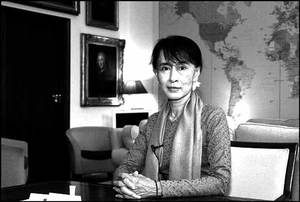
On that very same day, U Aye Ko, the GeneralSecretary of BSPP, permitted members of the PyithuTatmadaw, People's Police Force, and other employeesto quit as party members of the BSPP.
(3)
Chapter (3)
The Military Takes Over with a Coup d'état
As the demonstration continued without ceasingwith calls for an interim government also continuing, andas Dr. Maung Maung, Chairman of BSPP and of the Councilof State, can no longer maintain authority of the country,he signaled the Chief of Staff of the Defense Services,General Saw Maung (later to become senior general) forthe military to take over the country.
In that manner, the forming of an interimgovernment that the entire public asked for was ignored,and on September 18, 1988, the military took power overthe country by force. In the history of Myanmar, there werethree times that military had taken over power - once in1958, another in 1962, and the present one, in 1988.
After having taken power, on that same day, throughDeclaration No. 1/88, the formation of the State Law andOrder Restoration Council (SLORC) was announced. TheSLORC is composed of –
(1) General Saw Maung - Chairman
(2) Lieutenant Colonel Than Shwe - Member
(3) Vice Admiral Maung Maung Khin - Member
(4) Major General Tin Tun - Member
(5) Brigadier General Aung Ye Kyaw - Member
(6) Major General Phone Myint - Member
(7) Major General Sein Aung - Member
(8) Major General Chit Swe - Member
(9) Brigadier General Kyaw Ba - Member
(10) Brigadier GeneralMaung Thint - Member
(11) Brigadier General Maung Aye - Member
(12) Brigadier General Nyan Lin - Member
(13) Brigadier General Myint Aung - Member
(14) Brigadier General Mya Thin - Member
(15) Brigadier General Tun Kyi - Member
(16) Brigadier General Aye Thaung - Member
(17) Brigadier General Myo Nyunt - Member
(18) Brigadier General Khin Nyunt - Secretary (1)
(19) Colonel Tin Oo - Secretary (2)
On September 18, 1988, the SLORC withDeclaration No. 2/88, announced the dissolving of thePyithu Hluttaw, the Council of State, Council of Ministers,Council of People's Justices, Council of People's Attorneys,Council of People’s Inspector, and all levels of the People’sCouncils, and also announced the dismissal of all thedeputy ministers from their respective positions.
On that same day, with Declaration No. 3/88, it wasannounced that Myanmar will continue with itsindependent and active foreign policy. In continuation,
Order No. 2/88 was issued for the general public to followand Order No. 3/88 was issued for public servants toresume their duties. According to Order 3/88, allemployees must return to their work places starting fromSeptember 19, 1988, and if they fail to return to their workplaces by September 26, they will be dismissed from theirduties.
On the same day of September 18, Declaration No.1/88, 2/88, and Order No. 1/88, 2/88 and 3/99 were issuedconsecutively, and started functioning as SLORC militarygovernment.
The SLORC Chairman, General Saw Maung, becamethe Prime Minister, and not only did he hold the positionsas head of the country as well as the Defense Ministerand Chief of Staff of the Defense Services, he also tookthe position of the Foreign Minister.
The SLORC government, right after taking power,viewed and named the 1988 movement as an anarchicmovement, squashed it in many different ways, andcontinuously conducted arrests. Although the governmenthad taken power, the BSPP and its leaders were stillincluded in the list, and it greatly defended the BSPP andstood by it. As it defended the BSPP and had stood by it,the people mockingly called SLORC as ‘Ne Win’s army’.Apart from that, the people also named the State Lawand Order Restoration Council as ‘Nyain Pee’ group. Theguidelines, policy, and activities of it had also been called‘mischievous Nyain Pee path’.
After that, on September 19, 1988, around one inthe afternoon at the Defense Ministry at Dagon Yeikthar,the SLORC summoned the commission members and helda meeting. At the meeting, SLORC members headed bySLORC Chairman General Saw Maung – LieutenantGeneral Than Shwe, Vice Admiral Maung Maung Khin(Navy), Major General Tin Tun (Airforce), Major GeneralSein Aung, Major General Chit Swe, Secretary 1 BrigadierGeneral Khin Nyunt, Secretary 2 Colonel Tin Oo(assassinated), and commission members headed byCommission Chairman U Ba Htay – U Saw Kyar Doe, USan Maung, U Kyaw Nyunt, and Commission Secretary UAye Maung were present at the meeting. The memberSaya Che was stuck in a heavy traffic and was not able tomake it to the meeting. In the meeting, the SLORCChairman said, "The Tamadaw and the public servantsare no longer members of any political party, we are neutralorganizations, and are organizations meant to serve thepeople, and we request the members of the commissionto hold the multi-party democracy general election in thefreest, fairest, and fastest manner to implement as fastas possible, the multi-party democracy that the peopletoday desire. Concerning with the duties of thecommission, we as an organization and as individuals,will not be controlling it in anyway, and whether in writingelection laws and regulations, or meeting with anyorganizations that the commission members want to meet,they can freely meet and obtain ideas, and write them.The laws written and approved by the commission will beenacted as fast as possible. In order to be able to holdthe multi-party democracy general election successfully,will fully provide the help needed."
In that manner, the SLORC, with the Declaration No.1/88 dated September 18, 1988, in order to hold the multipartydemocracy general election, gave the electioncommission formed during Dr. Maung Maung’s time, tocontinue with their duties. In order to implement the dutiesof the commission, the SLORC, on September 21, 1988,promulgated the Multi-Party Democracy General ElectionsCommission Law No. 1/88.
After doing a detailed study of the suggestions givenby the people and the political parties, the Pyithu Hluttawelection law was revised and submitted to the SLORC withthe intention of using it only this time for the coming multipartydemocracy general election, and for future elections and bi elections, to revise it only when the time comes.
After coordinating and reviewing the draft of thelaw with the commission on May 25, 1989, the SLORCpromulgated the Pyithu Hluttaw Election Law (SLORC LawNo. 14/89) on May 30, 1989. That law comprises of 15chapters and 82 sections.
In implementing the regulations contained in thelaw, the detailed regulations that must be followed werepromulgated on June 30, 1989. After the regulations ofthe Political Parties Registration Law has been enacted,the commission allowed the registration of the politicalparties that intend to take part in the elections startingfrom September 30, 1988, and the commission set thelast date as February 28, 1989.
After the forming and registering of political partieswere official allowed, from working together as ‘Aung-Suu-Tin’, the Central Executive Committee of the NationalLeague for Democracy was formed on September 27, 1988,with four persons of U Aung Gyi, four of Daw Aung SanSuu Kyi, and four of U Tin Oo, making a total of 12 persons.After that, it was officially submitted for registration, andthe election commission officially recognized it as anofficial party through Declaration No. 3, dated October 3,1988.
The four from Daw Aung San Suu Kyi’s side were -Daw Aung San Suu Kyi, U Win Tin, Daw Myint Myint Khin,and U Aung Lwin (movie actor and director). At the timewhen it was first formed, the members of the CentralExecutive Committee of National League for Democracy(NLD) were . . .
(1) U Aung Gyi - Chairman
(2) U Tin Oo - Vice Chairman
(3) Daw Aung San Suu Kyi - General Secretary
(4) U Kyi Han - Secretary/Member
(5) U Chit Khaing - Secretary/Member
(6) U Win Tin - Secretary/Member
(7) Daw Myint Myint Khin - Social Class SectionHead
(8) U Lwin - Head of Trustees
(9) U Aung Lwin - Head of InformationDepartment
(10) U Aung Shwe - Head of OrganizingSection
(11) U Kyi Maung - Researcher
(12) U Ba Shwe - Head of Administration
The National League for Democracy, at the very startof its formation, became the favorite political organizationof the people. In a short length of time, the number ofparty members of the National League for Democracyincreased greatly.
After that, the Central Committee with 30 memberswas formed. Just as in the time when the Central ExecutiveCommittee was formed, the Central Committee was alsoformed with 10 persons each from U Aung Gyi, Daw AungSan Suu Kyi, and U Tin Oo. The new members of the centralcommittee were -
(1) U Khin Nyo
(2) U Zaw Win Oo
(3) U Min Din
(4) U Kyaw Myint Lay
(5) U Thar Hto
(6) U Thein Naing (Distinction)
(7) U Khin Maung Maung Myint
(8) U Maung Maung
(9) U Nan Nwe
(10) U Bo Aung
(11) U Thaung Dan
(12) U Hla Maung
(13) U Saw Myint
(14) U Shwe
(15) U Aye Maung
(16) U Tin Aye
(17) Bo Ye Htut (Memeber of the 30 Comrades)
(18) U Than Tun
(19) U Chein Poe
(20) U Hla Maung
(21) U Tun Tin
(22) U Thaw Ka (Maung Thaw Ka)
(23) U Ko Yu (Maung Ko Yu)
(24) U Moe Thu (Maung Moe Thu)
(25) U Chan Aye (Maung Su San)
(26) Dr. Tin Myo Win
(27) Dr. Thet Min
(28) U Win Hket
(29) U Tin Shwe
(30) U Khin Maung Swe
The National League for Democracy at the very startof its formation, handed 25 membership forms to each ofthe party members who came from various regions of thecountry and those who wished to continue being active,and recognized them as temporary organizers. In thatmanner, the number of the league’s members increasedgreatly within a very short period. The popularity gainedwithin a short period of time that even surprised all theother political parties, was because of the hope and respectthe general public had for the league’s General Secretary,Daw Aung San Suu Kyi.
The first problem that arouse inside the NationalLeague for Democracy that had gained a huge supportfrom the people was first started by the league’s Chairman,U Aung Gyi himself. The problem came from his claimthat - "There are communists within the league, they willhave to be removed as fast as possible". U Aung Gyi’s emergency assessment dated November 29, 1988 was asfollows –
Emergency Assessment
(1) In the present situation, communists and thosewho favor communism have grown with theNational League for Democracy.
(2) Another factor that can cause disqualificationis a financial issue. It is needed to have theStates and Divisions audited.
(3) Various resistance movements, underground,and communist activities can be pointed at theelections and get disqualified.
(4) It is therefore important that ‘Aung-Suu-Tin’should not be divided. It needs great attention.
(5) Because of that, communists and procommunistswithin ‘Aung-Suu-Tin’ should berequested to leave.
(6) As in the saying - ‘if the leg is not strong, thehand should be strong, and if the hand is notstrong, the leg should be strong’, the sameapplies in the case National League forDemocracy, were it to be disqualified, a reserveorganization is needed.
(7) As the Union National Democracy Party (UNDP)is only a reserve organization, and is under theflag of the National League for Democracy. Wehave to work hard on all side so that theNational League for Democracy will not fallapart for any reason. Quick clarifications areneeded concerning with incitements from otherorganizations to avoid misconceptions.
(8) The Union National Democracy Party should act,in the manner of that of the Pyithu Yebaw,Socialist Independent activities under the Anti-Fascist People's Freedom League’s flag duringthe time of independence, like the way thepresent veterans groups are active, must act asa unified national force.
Aung Gyi
9.10.88
The eight persons who U Aung Gyi branded ascommunists and wanted to be removed were – U WinTin, Daw Myint Myint Khin, U Aung Lwin, U Tun Tin, U KoYu, U Chan Aye (Maung Su San), U Tin Shwe (Monywa),and U Win Khet.
Although the majority of the members of the CentralExecutive Committee and the Central Committee tried toconvince U Aung Gyi that it should not be done like that,the problem wasn’t settled and it went to the point wherevotes had to be taken to clear the matter. In taking thevotes, it was agreed that if U Aung Gyi loses, he is to quitand if the group of eight persons lose, they will have toquit. In accordance with that agreement, 42 persons,including 12 members of the Central Executive Committeeand 30 members from the Central Committee voted on it.As even U Aung Gyi’s own people objected to U Aung Gyi’sploy, he eventually lost the votes. Because of that, U Aung Gyi had to resign as Chairman of the league. Togetherwith U Aung Gyi, 12 people from U Aung Gyi’s side - U KyiHan, U Ba Shwe, U Nan Nwe, U Khin Maung Maung, UThar Hto, U Thein Naing, U Min Din, U Khin Nyo, U KyawMyint Lay, U Bo Aung, U Maung Maung, and U Zaw WinOo also resigned from their positions.
After that, the National League for Democracy,within December 1989, reorganized the Central ExecutiveCommittee. The new Central Executive Committee wasas follows:
(1) U Tin Oo - Chairman
(2) Daw Aung San Suu Kyi - General Secretary
(3) U Win Tin - Secretary
(4) U Chit Khaing - Secretary
(5) U Kyi Maung - Researcher
(6) U Aung Shwe - Organizer
(7) U Lwin - Trustee
(8) U Aung Lwin - Information Officer
(9) Daw Myint Myint Khin - Social Class Section
U Aung Gyi and the twelve announced theirresignation from the league, and the league alsoannounced that it had dismissed U Aung Gyi and the twelvefrom the league. U Aung Gyi and his group separatelyformed the ‘Union National Democracy Party’.
After U Aung Gyi and his group left, the NationalLeague for Democracy, instead of becoming weak, itactually even became stronger. The number of parties thatallied with the National League for Democracy increasedto 46 parties. The Veterans Yebaw Party and the NationalDemocracy Party became like the left and right wings ofthe National League for Democracy.
As an information providing function for theNational League for Democracy, the ‘Hmattan Hlwar’Journal was published regularly. In that journal, objectionsagainst the wrongful arrests, punishments, and unfaircases that happened in different areas of the country werestated.
Because of that, the Ministry of Home and ReligiousAffairs promulgated Printers and Publishers CentralRegistration Committee Directive (38). It was announcedthat if the Printers and Publishers Registration Law of 1962is not followed, punitive actions will be take. Thus, moreresentment grew over the SLORC governments.
In May 1989, the Maharnandar Publishing Houselocated at No. 145, 37th Street, Kyauktada Township,Yangon, was convicted by the military regime forpublishing illegal journals, and the materials of theNational League for Democracy under publication wereconfiscated. That incident pivoted the NLD to the path ofconfrontation.
After that, on June 6, 1989, the NLD informed that itcould not abide by the Directive 38 of the Ministry of Homeand Religious Affairs.
Within the first week of June, Daw Aung San Suu Kyidiscussed with literary experts from the National Leaguefor Democracy – Maung Thaw Ka, Daw Myint Myint Khin,Tharrawaddy San San Nwe, Maung Ko Yu, Maung WunTha, Maung Khet Pan, and U Tin Mo. In that discussion, Sayar Maung Thaw Ka read out a quote from Henry DavidThoreau to Daw Aung San Suu Kyi. All the members likedit and everyone read out a passage that will go well inBurmese. Daw Aung San Suu Kyi also liked their idea andat the NLD meeting, she gave the responsibility ofdiscussing the path of confrontation to U Win Tin. In theexecutive committee meeting, U Win Tin proposed theslogan – ‘defy all orders and authority disapproved by themajority’. Everyone agreed to it and in printing it as NLD’sslogan, and it boldly stated that "this journal is publishedas a defiance against the suppressive Order of theSLORC’s Home Ministry".
Concerning with that matter, Daw Aung San Suu Kyisaid at the press conference held in June 1989 at theLeague’s office –
"We have already announced about our defiance ofauthority. It is to disobey the unfair Order, and the ‘SLORC’recognizes it. The reason why we disobey the unfair orderand authority is . . . what is important? It is to be able tofreely publish. During last week’s press conference, wehave already talked about this matter. If according to thePrinters and Publishers Registration Law of 1962, ourorganization is an organization that has the right to freelypublish. But this right has been banned by that Order andwe don’t have the right to freely publish. When they saythat we cannot publish, not only do we not get the rightthat we deserve, it can be clearly seen that it is gettinglesser and lesser. For that reason, we will have to defythat Order. We will have to continue publishing the thingswe have to publish.
By looking at things that happened in the past threeor four days, it is quite obvious how much we need topublish documents. The SLORC held a press conferenceand it was announced form the Burma BroadcastingService and published in the Working People’s Dailynewspaper. They have it for two successive days and werenot satisfied, today, they even placed it on an extra sheet.Some may think that this was done in goodwill for us. Butif you look at what is written in it, it is clear that it wasnot done out of goodwill.
Therefore, if they one-sidedly use the BurmaBroadcasting Service and the Working People’s Dailynewspaper to attack us, it is obvious that we need to beable to freely publish. If the SLORC wants to do it correctly,and if they publish us in the newspapers, and also in theBurma Broadcasting Service, I am ready to admit that weare wrong and that the SLORC is really doing it with goodwill. So . . . there are gentlemen from the Working People’sDaily present here now. If you would published the thingsthat I’ve said correctly and completely, I will once moreapologize to the SLORC, that I have been mistaken. That Imistook things. I have the courage to say that the SLORCwas doing it with goodwill."
Not very long after that, The SLORC governmentannounce declaration 2/89 concerning with commemorationof the Martyrs Day.
The complete text of the declaration is as follows:
(1) The State Law and Order Restoration Council isworking with the set objective of successfullyholding the multi-party democracy general elections. Apart from that, the government is commemoratingimportant dates that are related with the state. TheState, as in previous years, will therefore overseethe commemoration of the 42nd Martyrs Dayceremony which will be held on July 19, 1989.
(2) From the State Law and Order Restoration Council,State organizations, family members of the martyrswho had lost their lives in the hands of thecolonialists, diplomatic organizations, and thepolitical parties that have registered at the multipartydemocracy general election commission willbe attending the ceremony paying their respects.
(3) In order to attend the 42nd Martyrs Day Ceremony,the commemorating committees have alreadyinvited the nine families of the martyrs. Thefollowing eight families of the martyrs have repliedin writing that they will be attending the ceremony:
(a) Family of Minister Thakin Mya
(b) Family of Minister U Ba Cho
(c) Family of Minister U Razak
(d) Family of Minister U Ba Win
(e) Family of Minister U Ba Khine
(f) Family of Mongpawn Sawbwa Sao Sam Tun
(g) Family of Secretary U Ohn Maung
(h) Family of Yebaw Ko Htwe
(4) Although the above eight families of the martyrsattended the 42nd Martyrs Day Ceremony formalrehearsal that was held on July 16, 1989, the familyof Bogyoke Aung San did not attend. And they stillalso haven’t yet informed us that they will beattending the 42nd Martyrs Day Ceremony.
(5) As the Election Committee had invited the politicalparties that had registered at the Multi PartyDemocracy General Election Commission, 70political parties had informed that they will beattending the 42nd Martyrs Day Ceremony. Thenames of the parties that will be attending theceremony were published in the daily newspapers.
(6) As it has always been traditionally done,arrangements had also been made to enable thegeneral public to come to the Arzarni Mausoleumand salute the martyred leaders after the ceremonyorganized by the State is over. Therefore the generalpublic who wishes to peacefully pay their respects,they can come to the Arzarni Mausoleum either oneby one or in a group of not more than 5 persons.
(7) It is needed for the general public to be able to paytheir respects to the arzarni leaders. Therefore goingaround in procession, shouting slogans, instigatingto cause disturbances, causing disturbances,organizing by force and gathering people in orderto make political profit are prohibited. It was alsoannounced that any violation of the prohibitions willbe taken legal actions.
By the command of –
(Maung Ko)
Secretary
Union of Burma Government
Apart from that, on July 19, 1989, in the WorkingPeople’s Daily, it can be seen that it was published underthe title – "The confrontation program of Bogyoke AungSan was the program set during the British colonial times. . . Tamadaw is an organization that is opposing thecolonists and protecting the independence. The people,in coming to the Arzarni Mausoleum to pay tribute, mustbe done under our security program".
After that, on July 19, 1989, Daw Aung Suu Kyi, inorder to avoid unwanted affliction to the people, cancelledthe Arzarni Day marching plan. She also gave directionsto have the Arzarni Day ceremony done at the League’sOffice.
 ဒုတိယ ကမာၻစစ္ မွတ္တမ္းမ်ား |  လူငယ္ႏွင့္ႏိုင္ငံေရး |  ႏွစ္ဆယ္ရာစု အေက်ာ္ၾကားဆံုး အာရွေခါင္းေဆာင္မ်ား |